January 18, 2024
India reinforces its status as a Resilient Global Economy and a Preferred Investment Destination at Davos.
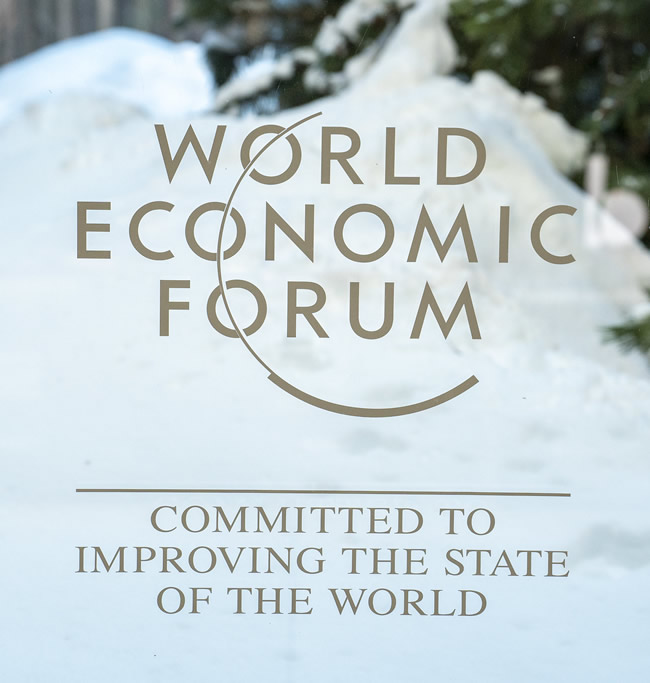
Photo: Impressions from the World Economic Forum Annual Meeting 2024 in Davos-Klosters, Switzerland. January 11, 2024. Image provided by & copyright © World Economic Forum/Pascal Bitz.
New Delhi, January 18, 2024 — The 54th Annual Meeting of the World Economic Forum (WEF) takes place from January 15 to January 19, 2024, in Davos, Switzerland, with India being the center of attention under the theme “Building Trust.” WEF’s workstreams align with India’s vision of growth, carbon neutrality, sustainability, a robust economy, and the concept of “Vasudhaiva Kutumbakam: The World Is One Family,” which India championed during its G20 presidency. India’s presence at Davos reinforces its status as a resilient global economy and a preferred investment destination.
Smriti Irani, Minister of Women & Child Development; Hardeep Singh Puri, Minister of Petroleum & Natural Gas, Housing & Urban Affairs; Ashwini Vaishnaw, Minister of Railways, Communications, Electronics & IT; and RK Singh, Secretary, DPIIT, Ministry of Commerce & Industry will lead the Government of India. They will participate in various sessions of the World Economic Forum, discussing topics such as Education, Biofuels, Gender Gaps, Renewables, Semiconductors, and Manufacturing alongside other global political and business leaders.
India’s presence at WEF secures four distinct spaces, each dedicated to illuminating the India Opportunity and unfolding its Growth Story to global investors:
India Engagement Centre: This lounge will showcase India’s digital public infrastructure, vibrant startup ecosystem, burgeoning energy sector and host fireside chats on globally significant pillars.
Experience India Centre: This lounge will unveil the technological leaps powered by New India, its commitments to sustainability and inclusivity, and its vibrant culture.
India Investment Centre: This will serve as a center for Government-to-Business (G2B) and Business-to-Business (B2B) networking, hosting roundtables, sessions, and panels on leading topics.
We Lead Lounge: This year, a dedicated gender lounge, “We Lead Lounge,” will focus on women’s participation in various walks of life, financial inclusion, and bridging the digital gender gap.
The India centers started with a compelling panel discussion on “Beyond Borders: India’s Impact on the World Stage” on the first day. Organized as a cornerstone event, the panel delved into India’s evolving role in the global landscape. PHDCCI, in collaboration with Invest India, organized this panel, providing a comprehensive exploration of India’s contributions and influence worldwide, offering insights that resonate beyond geographical borders.
The India Engagement Centres will catalyze meaningful dialogues and initiatives, solidifying their role as pivotal hubs for fostering collaboration and business cooperation on international fronts.
At WEF, 21 sessions will be held over five days, showcasing India’s opportunities and opening doors for discussion on Manufacturing, Technology, Gender-based impact, Sustainability, Mobility, Startups, Healthcare, AI, etc.
In tandem with the India Lounges, the establishment of five State Lounges underscores India’s consolidated and prominent role at WEF, fostering collaboration and discourse on a global scale. The five states include Karnataka, Maharashtra, Tamil Nadu, Telangana, and Uttar Pradesh.
The Indian business representatives number over 80, and a few Indian companies have established their presence through Lounges in Davos. CII would organize sessions and media panels to promote various aspects of India’s growth story and its successful leadership of the B20. In addition, PHDCCI is also actively participating in showcasing various strong themes representing opportunities in India.
Source: Ministry of Commerce & Industry, Government of India
|GlobalGiants.Com|







Edited & Posted by the Editor | 1:36 PM | View the original post
January 20, 2023
India Meets with World Economic Forum to advance Progress in addressing Socioeconomic Challenges and G20 Agenda
World Economic Forum values its nearly 40-year collaborative history with India and looks forward to continued cooperation.
As part of its G20 presidency, India aims to promote just and equitable growth while also making significant progress on the most pressing domestic challenges.
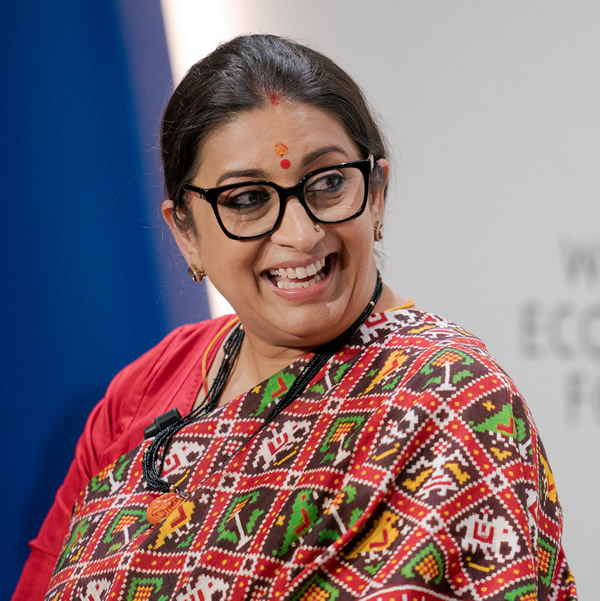
Photo: Smriti Zubin Irani, Minister of Women and Child Development of India, speaking in the “Economics of Women’s Health” session at the World Economic Forum Annual Meeting 2023 in Davos-Klosters, Switzerland, January 17, 2023. Image provided by & Copyright © World Economic Forum/Manuel Lopez.
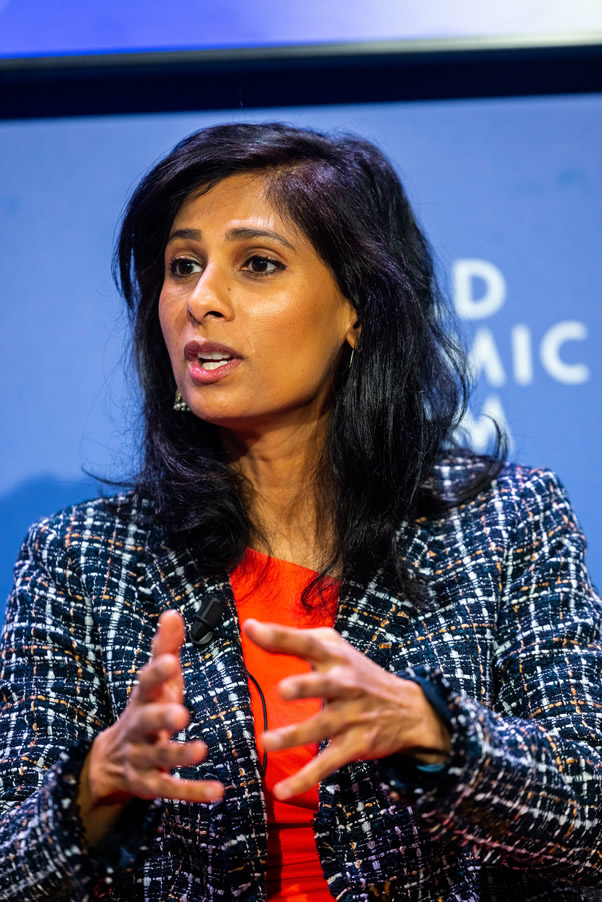
Photo: Gita Gopinath, International Monetary Fund (IMF), speaking during the “Fiscal Expansion: A Welcome Return or Ticking Bomb?” session at the World Economic Forum Annual Meeting 2023 in Davos-Klosters, Switzerland, January 18, 2023. Image provided by & Copyright © World Economic Forum/Ciaran McCrickard.
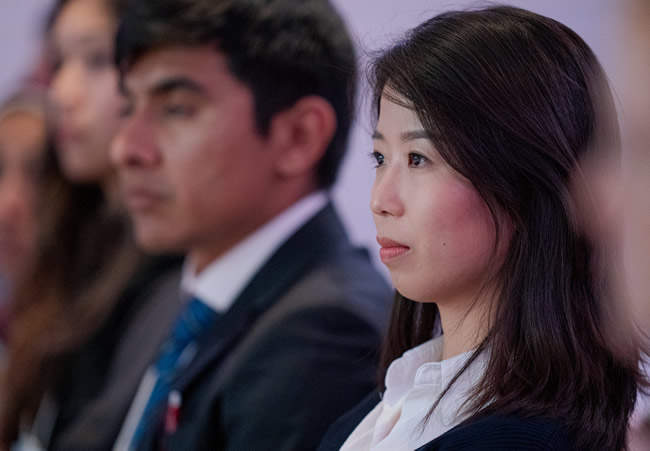
Photo: Participants at the “30x30 Ambition: Next Steps after Montreal” session at the World Economic Forum Annual Meeting 2023 in Davos-Klosters, Switzerland, January 19, 2023. Image provided by & Copyright © World Economic Forum/Manuel Lopez.
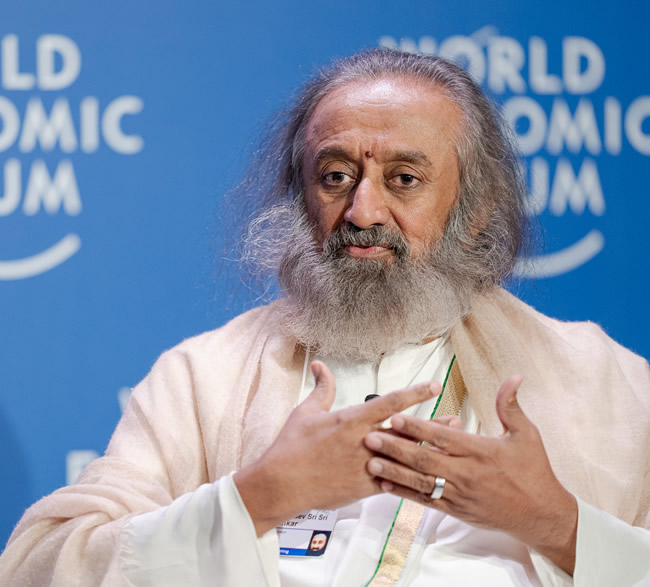
Photo: Gurudev Sri Sri Ravishankar, Founder, Art of Living Foundation, India, speaking in the “Renaissance of South Asia?” session at the World Economic Forum Annual Meeting 2023 in Davos-Klosters, Switzerland, January 19, 2023. Image provided by & Copyright © World Economic Forum/Manuel Lopez.
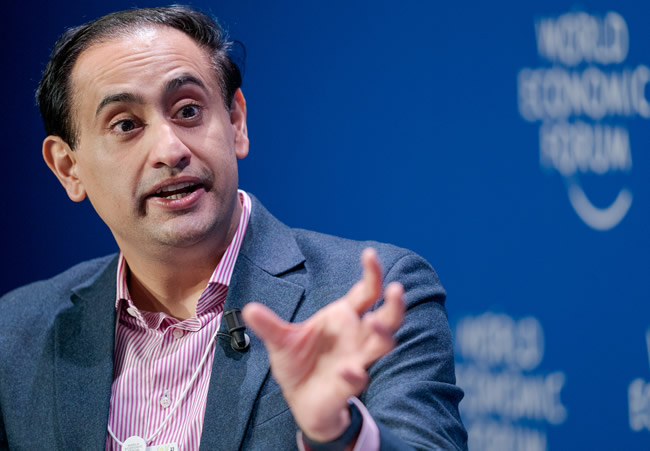
Photo: Rahul Kanwal, News Director, India Today and Aajtak, India Today Group, India, speaking in the “Renaissance of South Asia?” session at the World Economic Forum Annual Meeting 2023 in Davos-Klosters, Switzerland, January 19, 2023. Image provided by & Copyright © World Economic Forum/Manuel Lopez.
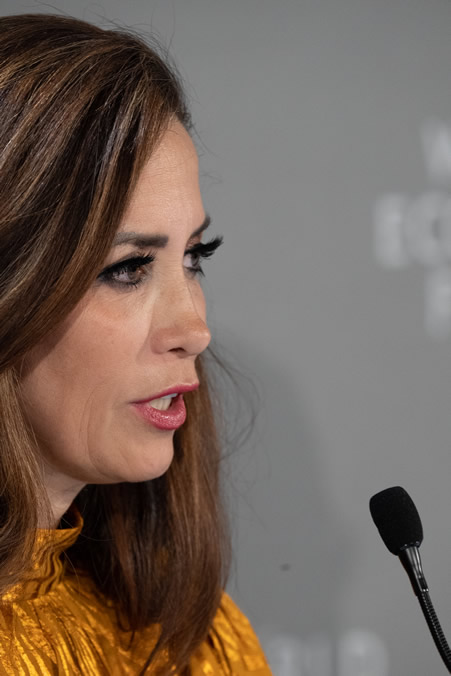
Photo: Claudia Romo Edelman, Founder, and CEO, Hispanic Star, USA, speaking in the “Press Conference: The Hispanic Promise 2.0” session at the World Economic Forum Annual Meeting 2023 in Davos-Klosters, Switzerland, January 17, 2023. Media Village, Press Conference Room. Image provided by & Copyright © World Economic Forum/ Greg Beadle.
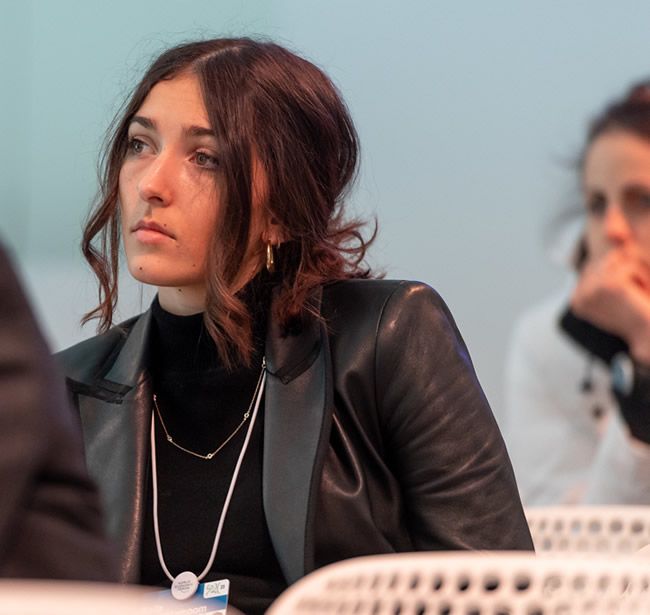
Photo: Participants at the “Reversing the Tide of Global Inequality” session at the World Economic Forum Annual Meeting 2023 in Davos-Klosters, Switzerland, January 19, 2023. Congress Centre - Spotlight. Image provided by & Copyright © World Economic Forum/Sandra Blaser.
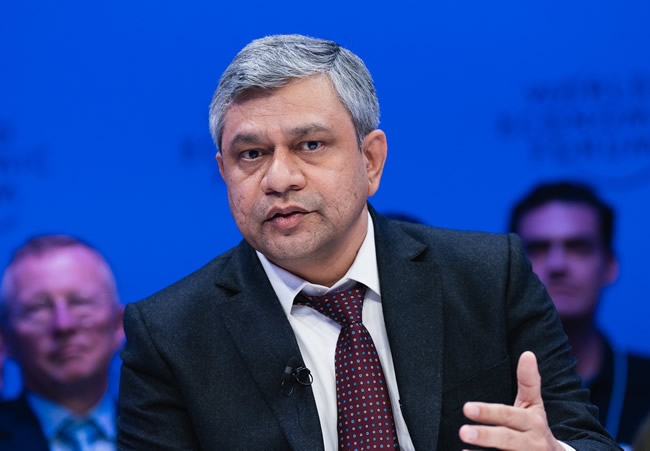
Photo: Ashwini Vaishnaw, Minister of Railways; Minister of Communications; and Minister of Electronics and Information Technology of India, speaking in the “Learning from Semiconductor Supply Shocks” session at the World Economic Forum Annual Meeting 2023 in Davos-Klosters, Switzerland, January 19, 2023. Image provided by & Copyright © World Economic Forum/Sikarin Fon Thanachaiary.
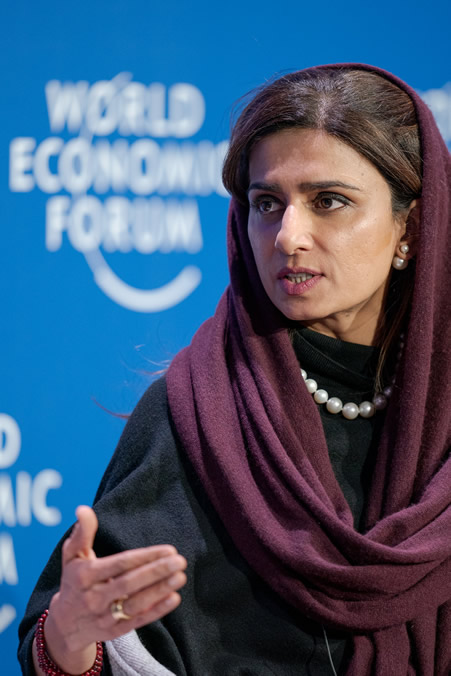
Photo: Hina Rabbani Khar, Minister of State for Foreign Affairs, Ministry of Foreign Affairs of Pakistan, speaking in the “Renaissance of South Asia?” session at the World Economic Forum Annual Meeting 2023 in Davos-Klosters, Switzerland, January 19, 2023. Image provided by & Copyright © World Economic Forum/Manuel Lopez.
Davos, Switzerland, January 20, 2023 - In Davos, world leaders continue to progress on solutions for the most pressing crises affecting the world. The World Economic Forum Annual Meeting 2023 comes as multiple concerns deepen divisions and fragment the geopolitical landscape. As a result, governments and businesses must address people’s immediate, critical needs while laying the groundwork for a more sustainable, resilient world by the decade’s end.
The program simultaneously addresses immediate crises and future long-term challenges and helps set the scene for India’s G20 presidency.
“I had the pleasure of meeting the Indian ministerial delegation and many of its top business leaders,” said Klaus Schwab, Founder and Executive Chairman of the World Economic Forum. “I commend the country’s decisive action on the climate case for renewables, its contribution to the global healthcare ecosystem, the focus on an economic model for women-led development, and its leadership on digital public infrastructure. India remains a bright spot amid global geoeconomics and geopolitical crises.”
The World Economic Forum shares a 38-year history with India and looks forward to continued partnership with the country during its G20 presidency under the leadership of Prime Minister Narendra Modi.
India is promoting just and equitable growth for all in the world during its G20 presidency.
“India’s G20 presidency comes at a crucial time. Prime Minister Modi’s leadership is critical in this fractured world,” Schwab said.
World leaders had gathered at the World Economic Forum Annual Meeting 2023 in the first major international gathering to address ongoing economic, energy, and food crises while laying the groundwork for a more sustainable, resilient world.
While many economists forecast recessionary risks in 2023 and see geopolitical tensions continuing to shape the global economy, there are glimmers of hope that pressures on food, energy, and inflation may be peaking.
“A perfect storm plagues our world on several fronts,” said United Nations Secretary-General António Guterres. He called for urgent action on many interconnected challenges, including the global economic crisis, climate, income and gender inequality, US-China relations, Russia’s invasion of Ukraine, and the lingering effects of the COVID-19 pandemic. “Now more than ever, it is time to forge the pathways to cooperation in our fragmented world,” he concluded.
Cooperation is becoming more virtual, and the Forum’s Global Collaboration Village showed how we could harness the metaverse for inclusive and effective international action. With the golden age of artificial intelligence underway, technology will provide more ways to bring people together.
“We can turn challenges into opportunities through collaboration, innovation, human goodwill, and ingenuity. It is the spirit of solving problems through mutual respect and cooperation. This is the spirit of Davos,” said Klaus Schwab, Founder and Executive Chairman World Economic Forum.
As crises converge, so too must the solutions. As a result, the Annual Meeting emphasized connections across significant systemic challenges. With over 480 sessions, more than 2,700 leaders - including over 350 public figures, government leaders, and 47 heads of state - came together at the Annual Meeting 2023 to address the world’s most pressing challenges.
Source: World Economic Forum
|GlobalGiants.Com|







Edited & Posted by the Editor | 1:30 PM | View the original post
January 11, 2023
World Economic Forum Annual Meeting 2023: Cooperation in a Fragmented World, Addressing Pressing Crises, Tackling Future Challenges
The World Economic Forum Annual Meeting 2023 will convene under the theme, Cooperation in a Fragmented World
It calls on world leaders to address immediate economic, energy, and food crises while laying the groundwork for a more sustainable, resilient world
Meeting will convene more than 2,700 leaders from 130 countries, including 52 heads of state/government

Photo: World Economic Forum Annual Meeting 2023, Davos, Switzerland. Photographer: Mattias Nutt. Image provided by & Copyright © World Economic Forum/Mattias Nutt. [File Photo]
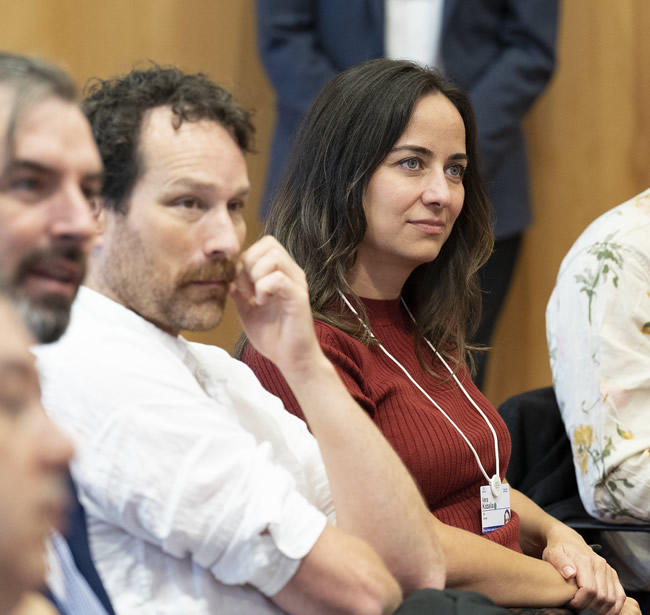
Photo: Participants at the World Economic Forum Young Global Leaders Alumni Gathering, Geneva, Switzerland. October 20, 2022. Photographer: Pascal Bitz. Image provided by & Copyright © World Economic Forum/Pascal Bitz. [File Photo]
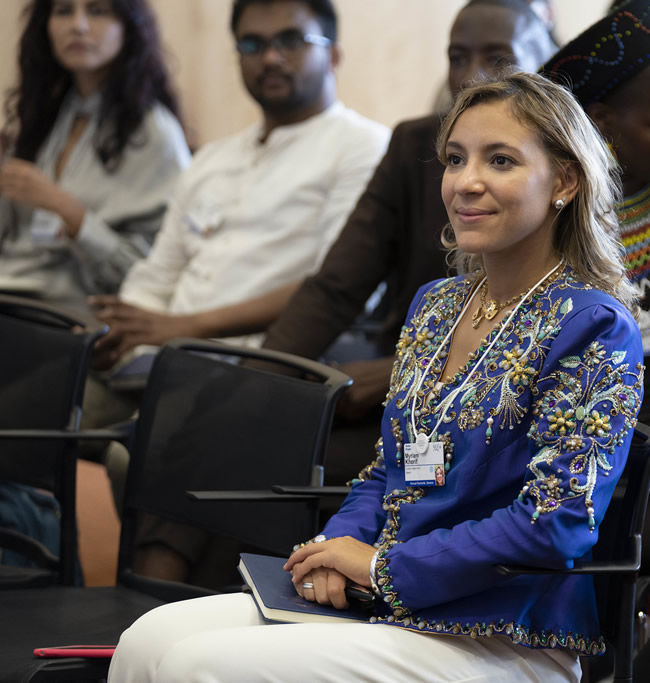
Photo: World Economic Forum Global Shapers Annual Summit, Geneva, Switzerland. September 3, 2022. Photographer: Pascal Bitz. Image provided by & Copyright © World Economic Forum/Pascal Bitz. [File Photo]
Geneva, Switzerland, January 10, 2023 - The World Economic Forum Annual Meeting 2023, taking place 16-20 January in Davos-Klosters, Switzerland, comes as multiple crises deepen divisions and fragment the geopolitical landscape. Leaders must address people’s immediate, critical needs while laying the groundwork for a more sustainable, resilient world by the decade’s end.
“We see the manifold political, economic, and social forces creating increased fragmentation on a global and national level. To address the root causes of this erosion of trust, we need to reinforce cooperation between the government and business sectors, creating the conditions for a strong and durable recovery. But, at the same time, there must be the recognition that economic development needs to be made more resilient, more sustainable, and nobody should be left behind,” said Klaus Schwab, Founder and Executive Chairman of World Economic Forum.
The program of the 53rd Annual Meeting focuses on solutions and public-private cooperation to tackle the world’s most pressing challenges. It encourages world leaders to work together on the interconnected issues of energy, climate, and nature; investment, trade, and infrastructure; frontier technologies and industry resilience; jobs, skills, social mobility, and health; and geopolitical cooperation in a multipolar world. Particular emphasis is on gender and geographical diversity across all sessions.
Switzerland is the host country for the Annual Meeting. More than 2,700 leaders will participate this year, with a strong representation from all key regions of the world. Top political leaders taking part include:
- Olaf Scholz, Federal Chancellor of Germany;
- Ursula von der Leyen, President of the European Commission;
- Roberta Metsola, President of the European Parliament;
- Yoon Suk-yeol, President of the Republic of Korea;
- Cyril M. Ramaphosa, President of South Africa;
- Pedro Sánchez, Prime Minister of Spain;
- Alain Berset, President of the Swiss Confederation 2023 and Federal Councillor of Home Affairs;
- Ilham Aliyev, President of the Republic of Azerbaijan;
- Alexander De Croo, Prime Minister of Belgium;
- Gustavo Francisco Petro Urrego, President of Colombia;
- Félix Tshisekedi, President of the Democratic Republic of the Congo;
- Sanna Marin, Prime Minister of Finland;
- Kyriakos Mitsotakis, Prime Minister of Greece;
- Leo Varadkar, Taoiseach of Ireland;
- Maia Sandu, President of the Republic of Moldova;
- Aziz Akhannouch, Head of Government of Morocco;
- Mark Rutte, Prime Minister of the Netherlands;
- Ferdinand Marcos, President of the Philippines;
- Andrzej Duda, President of Poland;
- Aleksandar VuÄić, President of Serbia;
- Samia Suluhu Hassan, President of the United Republic of Tanzania;
- Najla Bouden, Prime Minister of Tunisia.
As well as:
- John F. Kerry, Special Presidential Envoy for Climate of the United States of America;
- Avril Haines, US Director of National Intelligence;
- Martin J. Walsh, Secretary of Labor of the United States;
- Katherine Tai, United States Trade Representative;
- Chrystia Freeland, Deputy Prime Minister and Minister of Finance of Canada;
- Christine Lagarde, President, European Central Bank.
Heads of international organizations taking part include:
- Antonio Guterres, UN Secretary-General;
- Kristalina Georgieva, Managing Director, International Monetary Fund;
- Ngozi Okonjo-Iweala, Director General, World Trade Organization;
- Jens Stoltenberg, Secretary General, North Atlantic Treaty Organization;
- Tedros Adhanom Ghebreyesus, Director General, World Health Organization;
- Fatih Birol, Executive Director, International Energy Agency;
- Catherine Russell, Executive Director, UNICEF;
- Mirjana Spoljaric Egger, President, International Committee of the Red Cross.
This year will bring about the highest-ever business participation at Davos, with over 1,500 leaders registered across 700 organizations, including over 600 of the world’s top CEOs from the World Economic Forum’s Members and Partners, with top-level representation from sectors such as financial services, energy, materials and infrastructure, information and communication technologies. They come as governments increasingly look to businesses to implement big ideas quickly and inclusively. There will also be a strong representation of Global Innovators who are transforming industries, with more than 90 mission-driven leaders from the Forum’s Technology Pioneers and recently launched Unicorn communities.
Leaders from civil society taking part in the Meeting include:
- Seth F. Berkley, Chief Executive Officer, Gavi, the Vaccine Alliance;
- Stephen Cotton, General Secretary, International Transport Workers’ Federation;
- Christy Hoffman, General Secretary, UNI Global Union;
- Hindou Oumarou Ibrahim, President, Association for Indigenous Women and Peoples of Chad;
- Azza Karam, Secretary-General, Religions for Peace;
- Oleksandra Matviichuk, Nobel Peace Prize Winner 2022 and President, Centre for Civil Liberties;
- David Miliband, President, International Rescue Committee;
- Luisa Neubauer, Climate Activist, Fridays for Future Movement;
- Kirsten Schuijt, Director-General, WWF International;
- Gurudev Sri Sri Ravi Shankar, Founder, Art of Living Foundation.
Among the new initiatives at the Annual Meeting is the Global Collaboration Village. This purpose-driven metaverse fosters more sustainable public-private collaboration and spurs action to deliver impact at scale. In addition, the first-ever metaverse multilateral meeting hosted by the Forum will bring together experts and leaders from finance, food, and retail to drive action on ocean health and seafood waste.
More than 160 of the Forum’s civic-minded young leaders will join as members of our Global Shapers, Young Global Leaders, and Social Entrepreneurs communities this year. WEF will also welcome nine Indigenous leaders bringing the knowledge and expertise of their communities to advance regional and global efforts in ecosystem restoration, inclusive trade, and sustainable development.
More than 125 experts and heads of the world’s leading universities, research institutions, and think tanks will join the Meeting, bringing the latest facts, insights, science, and data into the program and the Forum’s work.
The Arts and Culture program features several sessions and immersive art installations on preserving coral reefs, displaced peoples and the global refugee crisis, gender equality and female empowerment, and global sea-level rise. In addition, it will include the 27th Annual Crystal Awards and Cultural Leaders.
This year is the 20th anniversary of the Open Forum, which welcomes diverse people worldwide to listen and share experiences with experts and leaders on pressing issues. The theme is Our Environment: Lessons, Challenges, and Opportunities.
The 53rd Annual Meeting will also be climate-neutral for the sixth consecutive year. New initiatives to boost resource efficiency and reduce emissions will build on the Forum’s 2018 ISO 20121 certification for sustainable event management.
Source: World Economic Forum
|GlobalGiants.Com|







Edited & Posted by the Editor | 7:17 AM | View the original post
May 25, 2022
World Economic Forum's Open Forum returns to Davos.
The Open Forum Davos 2022 is hosting a series of panel discussions on 23-26 May, all open to the public upon registration.
Panelists include:
- Human rights activist and Nobel Peace Laureate Nadia Murad.
- Kyiv Mayor Vitaliy Klitschko.
- Climate activist Vanessa Nakate.
- Moderna CEO Stephane Bancel.
Discussion topics range from the climate crisis and youth mental health to the war in Ukraine and the Metaverse.

Photo: Impressions from the World Economic Forum Annual Meeting 2022 in Davos-Klosters, Switzerland. Image provided by & copyright © World Economic Forum/Mattias Nutt.
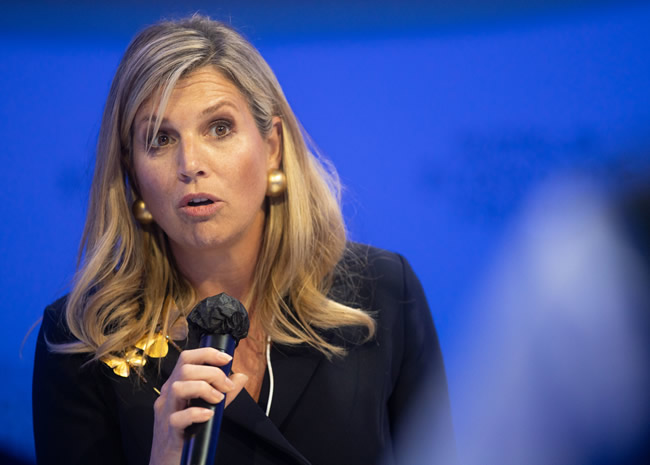
Photo: H.M. Queen Máxima of the Netherlands, Queen of the Netherlands; United Nations Secretary-General’s Special Advocate for Inclusive Finance, speaking in Unlocking Capital at Scale for Digital Inclusion at the World Economic Forum Annual Meeting 2022 in Davos-Klosters, Switzerland, May 24, 2022. Image provided by & copyright © World Economic Forum/Michael Calabrò.
Davos-Klosters, Switzerland, May 25, 2022 - As part of the World Economic Forum Annual Meeting 2022, this year’s Open Forum Davos is focusing on the impacts of the COVID-19 pandemic, the Russian invasion of Ukraine, and the role of multilateralism for peace in Europe as well as other global challenges.
Taking place for the first time since January 2020, the Open Forum offers a platform for debate and interaction on controversial issues between the public and scholars, business leaders, and policy-makers concerning improving the state of the world.
Young and diverse voices are also playing a prominent role in the discussions, with one session on youth mental health co-designed and moderated by students from Geneva, Switzerland. In addition, each session includes at least one member of the Forum’s Global Shapers Community, a wide-ranging network of people from all walks of life and different parts of the world.
Ignazio Cassis, President of the Swiss Confederation, among other high-level panelists, is joined by Ievgeniia Bodnya, who mobilized the Global Shaper Hub she leads in Kyiv to build the Support Ukraine. In another session, Kyiv Mayor Vitaliy Klitschko and his brother Wladimir, Chairman of the Klitschko Foundation, discuss how the Russian invasion has affected them and their country.
Also present at the Open Forum are climate activists, including 26-year-old Vanessa Nakate, author and climate advocate who addressed world leaders at the World Economic Forum 2020. The activists articulate how to turn words into action to fight the climate crisis. Gender equality is also featured prominently in the conversations.
The last two years have seen a blending of in-person and virtual interactions on the digital front. Peggy Johnson, Chief Executive Office of augmented reality company Magic Leap, will introduce the possibilities of the Metaverse. She will then join a panel of experts, including Pascal Kaufmann, President, and Founder of the Mindfire Foundation.
Additional panelists who are participating in this year’s Open Forum Davos include:
- Ignazio Cassis, President of the Swiss Confederation and Federal Councillor for Foreign Affairs of Switzerland
- Stephane Bancel, Chief Executive Officer, Moderna
- Isabella Eckerle, Associate Professor, Department of Medicine, University of Geneva
- Vivianne Heijnen, Minister for the Environment, Ministry of Infrastructure and Water Management of the Netherlands
- Mikaela Jade, Founder and Chief Executive Officer, Indigital
- Peggy Johnson, Chief Executive Officer, Magic Leap Inc.
- Marco Lambertini, Director-General, WWF International
- Edward Lewin, Vice-President and Head of Government and Public Affairs, LEGO Group
- Klaus Moosmayer, Chief Ethics, Risk and Compliance Officer, Novartis AG
- Seth Moulton, Congressman from Massachusetts
- Nadia Murad, Nobel Peace Laureate, Nadia’s Initiative; Co-Founder, Global Survivors Fund (GSF), Global Survivors Fund
- Anna Riedl, Cognitive Scientist, and Global Shaper, Vienna Hub
- Philipp Wilhelm, Mayor of Davos
- Sakena Yacoobi, Executive Director, Afghan Institute of Learning
Open Forum Programme
Monday, May 23
12.30 - 13.30 A Discussion with the Klitschkos
18.30 - 20.00 A Wake-Up Call from Nature
Tuesday, May 24
09.00 - 10.30 Growing Up in the Pandemic
14.30 - 16.00 Working Together for Peace
18.30 - 20.00 Ethical Decision-Making in Times of Crisis
Wednesday, May 25
09.00 - 10.30 Turning Words into Action
12.30 - 14.00 A Discussion about Equality
18.30 - 20.00 Racial Disparities in Refugee Treatment
Thursday, May 26
09.00 - 10.30 The Possibilities of the Metaverse
In its 19th year, the Open Forum Davos opens its doors to the public from 23 to January 26 in Davos, Switzerland. It is being held at the Tobelmühle Sports Hall, Tobelmühlestrasse 4 e, Davos Platz, Switzerland.
For over 50 years, the World Economic Forum has been the international organization for public-private cooperation. The Annual Meeting is the focal point for leaders to accelerate the partnerships needed to tackle global challenges and shape a more sustainable and inclusive future. Convening under the theme ‘History at a Turning Point: Government Policies and Business Strategies,’ the Annual Meeting 2022 and its 200 sessions bring together global leaders from business, government, and civil society.
Source: World Economic Forum
|GlobalGiants.Com|







Edited & Posted by the Editor | 2:46 AM | View the original post
January 17, 2022
Prime Minister Modi of India Urges All Countries to Embrace Sustainable Lifestyles through Vision of One Earth One Health
India challenges the world to ditch throwaway consumerism and shift to a circular economy, emphasizing India’s low per capita emissions.
Modi calls for the reform of multilateral organizations to fashion a more democratic approach to global challenges.
India is in the top three countries globally for unicorns, creating over 40 in 2021 and 60,000 start-ups.
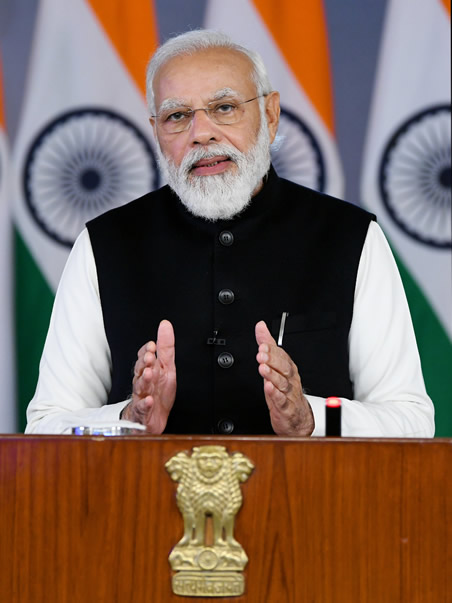
Photo: Narendra Modi, Prime Minister of India, delivers a ‘State of the World’ special address at the World Economic Forum’s Davos Agenda 2022 through video conferencing in New Delhi on January 17, 2022.
Geneva, Switzerland, January 17, 2022 - Prime Minister Narendra Modi of India addressed Davos Agenda 2022 to call on all countries to shift from a throwaway culture towards more sustainable lifestyles. Modi emphasized that while India is home to 17% of the world’s population, it contributes only 5% of global emissions.
“It is essential that we move away from today’s take-make-use-dispose economy and towards a circular economy,” he said. India, which co-launched the International Solar Alliance at COP26 to ensure universal access to affordable solar energy, today generates 40% of its energy from non-fossil sources. Modi underlined that the next phase of India’s growth would be “green, clean, sustainable and reliable.”
The prime minister questioned the ability of the world’s multilateral organizations to meet challenges that did not exist when they were created. He said that reforming these institutions is “the responsibility of every democratic country.” In a clear call for greater global cooperation, he said: “Today, more than ever before, countries need each other’s help - this is the only path to a better future.” He offered India’s vision of One Earth One Health as a means of responding to global challenges, from the COVID-19 pandemic to climate change.
India is an entrepreneurial powerhouse that has created 10,000 new start-ups in the past six months and over 40 unicorns in 2021, Modi said, propelling the country into the top three in the world for billion-dollar new ventures. Its digital infrastructure is developing rapidly, with over 4.4 billion transactions on its United Payments interface in the past month alone. Over 2020-2021, India attracted $82 billion in foreign direct investment - a new record. Modi said India is committed to becoming a trusted partner for global supply chains.
In a bid to improve the ease of doing business, Modi outlined his government’s measures to reduce government intervention to the minimum. He has done away with over 25,000 tax compliances in the past year and deregulated most sectors for investment, except for defense, aerospace, and telecoms. In addition, his government is investing $1.3 trillion on connectivity-related infrastructure through its GatiShakti National Master Plan, which includes connecting over 6,000 villages through an optical fiber. The plan’s aim, he said, is to “give new impetus to seamless connectivity for movement of goods, people and services.” India is also investing $26 billion to boost manufacturing and resilient supply chains.
The Prime Minister also spoke to the importance of collective and synchronized action to face global challenges. He highlighted new technology as an important area for countries to act together, “Another example is cryptocurrency. Given the kind of technology it is associated with, the decisions taken by a single country will be insufficient to deal with its challenges.”
Modi said India enters 2022 “infused with self-confidence.” Its economic growth is projected to hit 8.5%. It has already administered 1.6 billion COVID-19 vaccines. And, he added: “Our multilingual, multicultural environment is a great strength [that] teaches us not just to think of ourselves in times of crisis but to work in the best interests of the world.”
For over 50 years, the World Economic Forum has been the international organization for public-private cooperation. The Davos Agenda 2022 is the focal point at the start of the year for leaders to share their outlook, insights, and plans relating to the most urgent global issues. The meeting will provide a platform to accelerate the partnerships needed to tackle shared challenges and shape a more sustainable and inclusive future.
Source: World Economic Forum
|GlobalGiants.Com|







Edited & Posted by the Editor | 1:16 PM | View the original post
January 15, 2022
World Economic Forum: Davos Agenda 2022 to Mobilize World Leaders around Global Challenges
First global platform for crucial world leaders to share their visions for 2022
The Davos Agenda 2022 will convene on ‘The State of the World’
Heads of state and government will join CEOs and other leaders for a virtual week-long dialogue on critical collective challenges and how to address them
Dialogue will be a springboard to the Annual Meeting in Davos, scheduled for early summer

Photo: Impressions from the Annual Meeting 2019 of the World Economic Forum in Davos, January 20, 2019. Image provided by & copyright © World Economic Forum / Benedikt von Loebell.
Geneva, Switzerland, January 14, 2022 - Two years since the start of the COVID-19 pandemic, global leaders will convene for the World Economic Forum’s Davos Agenda 2022, from 17-21 January. This year, it will be the first global platform to provide an opportunity for crucial heads of state and government, together with chief executives and leaders from civil society and international organizations, to reflect on the “State of the World” and shape solutions for critical challenges in the year ahead.
Radically different pandemic experiences have exacerbated global divisions. Vaccine inequities, combined with new strains, have also slowed global economic recovery. However, as the Global Risks Report 2022 clarifies, COVID-19 is only one of the critical global challenges that may become unmanageable unless world leaders prioritize proactive collaboration. Accordingly, the Davos Agenda will drive concerted action among key international stakeholders.
Klaus Schwab, Founder and Executive Chairman of the World Economic Forum, said: “Everyone hopes that in 2022 the COVID-19 pandemic, and the crises that accompanied it, will finally begin to recede. But major global challenges await us, from climate change to rebuilding trust and social cohesion. To address them, leaders will need to adopt new models, look long term, renew cooperation and act systemically. The Davos Agenda 2022 is the starting point for the dialogue needed for global cooperation in 2022.”
Through Special Addresses and panels with leaders of G20 economies and international organizations, the Davos Agenda 2022 will provide crucial insights into a range of critical challenges. In addition, participants will hear first-hand how these leaders will drive action in these and other areas.
• World leaders delivering “State of the World” Special Addresses will include:
- Narendra Modi, Prime Minister of India;
- Kishida Fumio, Prime Minister of Japan;
- António Guterres, Secretary-General, United Nations;
- Ursula von der Leyen, President of the European Commission;
- Scott Morrison, Prime Minister of Australia;
- Joko Widodo, President of Indonesia;
- Naftali Bennett, Prime Minister of Israel;
- Janet L. Yellen, Secretary of the Treasury of the United States;
- Yemi Osinbajo, Vice-President of Nigeria.
The Davos Agenda 2022 will also mobilize government and business leaders, international organizations, and civil society to share their outlook, insights, and plans on the most urgent global issues such as climate change, social contracts, and vaccine equity. These sessions will also provide a platform for a broader connection, enabling the international public to engage and get included in the conversation.
• Key sessions will include:
- COVID-19 - What’s next? (January 17)
- Technology Cooperation in the Fourth Industrial Revolution (January 17)
- Renewing a Global Social Contract (January 18)
- Meeting the Challenge of Vaccine Equity (January 18)
- Navigating the Energy Transition (January 19)
- Accelerating and Scaling up Climate Innovation (January 19)
- ESG Metrics for a Sustainable Future (January 20)
- Live from Space: The Next Frontier for Knowledge and Action (January 20)
- Global Economic Outlook (January 21)
- Building Future Preparedness (January 21)
• The program will feature:
- Tedros Adhanom Ghebreyesus, Director-General, World Health Organization (WHO);
- Fatih Birol, Executive Director, International Energy Agency;
- José Pedro Castillo Terrones, President of Peru;
- Ivan Duque, President of Colombia;
- Anthony S. Fauci, Director, National Institute of Allergy and Infectious Diseases, National Institutes of Health of the United States of America;
- Yasmine Fouad, Minister of Environment of Egypt;
- Kristalina Georgieva, Managing Director, International Monetary Fund (IMF);
- Alejandro Giammattei, President of Guatemala;
- Al Gore, Vice-President of the United States (1993-2001) and Chairman and Co-Founder, Generation Investment Management;
- Paulo Guedes, Minister of Economy of Brazil;
- Paula Ingabire, Minister of Information Communication Technology and Innovation of Rwanda;
- Paul Kagame, President of Rwanda;
- John F. Kerry, Special Presidential Envoy for Climate of the United States of America;
- Christine Lagarde, President, European Central Bank;
- Guillermo Lasso, President of Ecuador;
- Ngozi Okonjo-Iweala, Director-General, World Trade Organization (WTO);
- Carlos Alvarado Quesada, President of Costa Rica;
- Abdulaziz Bin Salman Bin Abdulaziz Al Saud, Minister of Energy of Saudi Arabia;
- Nicolas Schmit, Commissioner for Jobs and Social Rights, European Commission;
- François Villeroy de Galhau, Governor of the Central Bank of France;
- Sarah bint Yousif Al-Amiri, Minister of State for Advanced Technology, UAE.
Source: World Economic Forum
|GlobalGiants.Com|







Edited & Posted by the Editor | 3:15 AM | View the original post
December 29, 2021
World Economic Forum's Annual Meeting 2022 Deferred

Photo: Impressions from the World Economic Forum Annual Meeting 2020 in Davos-Klosters, Switzerland. Image provided by & Copyright © World Economic Forum/Sikarin Fon Thanachaiary. [File Photo]
Geneva, 29 December 2021 - The World Economic Forum will defer its Annual Meeting in Davos, Switzerland, in the light of continued uncertainty over the Omicron outbreak.
The Annual Meeting was scheduled in Davos-Klosters, Switzerland, between 17-21 January 2022. The World Economic Forum now plans it for early summer.
Instead, participants will join a series of State of the World sessions bringing together global leaders online to focus on shaping solutions to the world’s most pressing challenges.
“Current pandemic conditions make it extremely difficult to deliver a global in-person meeting. However, preparations have been guided by expert advice and have benefited from the close collaboration of the Swiss government at all levels,” WEF stated.
“Despite the meeting’s stringent health protocols, the transmissibility of Omicron and its impact on travel and mobility have made deferral necessary,” the WEF announcement said.
“The health and safety of everyone involved in physical meetings - participants, collaborators, and the host community - have always been the Forum’s priority,” WEF added.
“The deferral of the Annual Meeting will not prevent progress through the continued digital convening of leaders from business, government, and civil society,” said Professor Klaus Schwab, Founder and Executive Chairman of the World Economic Forum. “Public-private cooperation has moved forward throughout the pandemic, and that will continue apace. We look forward to bringing global leaders together in person soon.”
Source: World Economic Forum
|GlobalGiants.Com|







Edited & Posted by the Editor | 11:48 AM | View the original post
November 9, 2021
India's Transition to a Green Economy Presents a $1 Trillion Opportunity.
A new study by the World Economic Forum presents a sectoral roadmap for India to accelerate decarbonization and drive global climate action efforts.
According to the report, India’s transition to a net-zero economy could create over 50 million jobs and contribute more than $1 trillion in economic impact by 2030.
As the economy transitions from agrarian and service-led towards manufacturing-led growth, India has an opportunity to accelerate its transition to a net-zero and green economy.
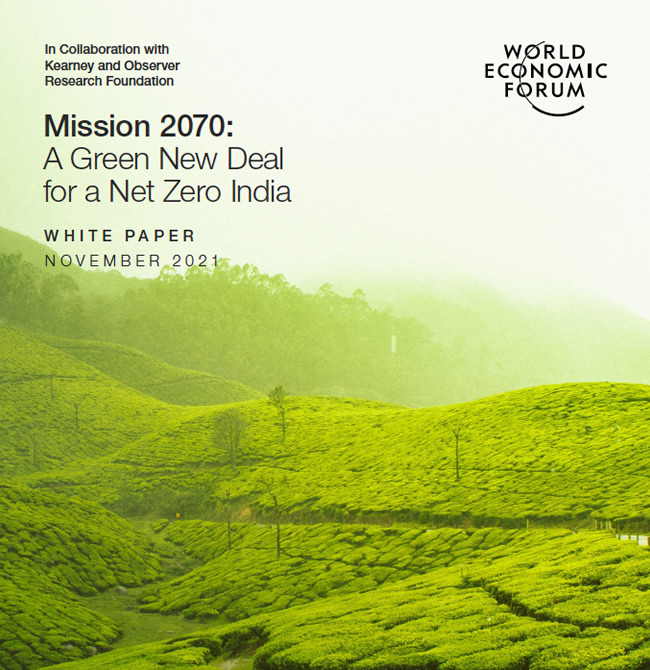
Geneva, Switzerland, 8 November 2021 - As consensus emerges on the urgency and magnitude of the transformation needed to decarbonize the global economy, India’s role and contributions will be critical if the world is to achieve current targets.
World Economic Forum today released a new report outlining how India’s path to decarbonization will have an estimated economic impact of over $1 trillion by 2030 and around $15 trillion by 2070.
The Mission 2070: A Green New Deal for a Net-Zero India report provides a roadmap for India’s transition to a low-carbon economy as it moves from agriculture and services to manufacturing and a greener economy.
Published in collaboration with Kearney and the Observer Research Foundation, the report underlines the potential to save lives, catalyze new industries, create jobs, and boost India’s contributions to addressing climate change.
At the ongoing United Nations Climate Change Conference (COP26) in Glasgow, Prime Minister Modi has committed India to an ambitious five-part Panchamrit pledge.
“How India continues to deliver growth and energy security to its citizens while ensuring the transition to a net-zero and green economy? That will define our collective success in the global fight against climate change,” said Sriram Gutta, Deputy Head, India, and South Asia, World Economic Forum. “We are calling on the government, businesses, and civil society to work with us to accelerate climate action and ensure a future that is good for both people and the planet.”
The report highlights five sectoral pillars and four cross-sectoral enablers for India to maximize the opportunities presented by a Green New Deal, with the potential to create more than 50 million net new jobs and over $15 trillion in economic value by 2070.
The five pillars - energy, mobility, industry, infrastructure and cities, and agriculture - contribute to over 90% of India’s greenhouse gas emissions. According to the report, India will need to address these pillars, alongside four cross-sectoral enablers, as part of its green transition.
These enablers are an accelerated approach to green technology innovation, an overarching framework to catalyze green finance, an integrated approach to carbon, capture, utilization, storage, and climate adaptation plan. The five pillars and four enablers are dependent on India’s continued economic growth, driven by technological development, financial innovation, and strong political leadership.
“This report visualizes India becoming the world’s first $5 trillion and after that $10 trillion ‘off carbon economy”, said Samir Saran, President, Observer Research Foundation. “In the decade ahead, we will all need to work together on sectoral and geographical pathways to build a green subcontinent.”
“India needs to action two transformations: an economic transformation to drive prosperity and a green transformation to drive sustainability. However, our research indicates that the two need not conflict. On the contrary, India’s green transition might be the most viable way to fuel its economic aspirations,” said Viswanathan Rajendran, Partner, Kearney India.
A Green New Deal for India will need all stakeholders - government, the private sector, investors, and civil society - to step forward and catalyze the next green revolution. India has an opportunity to take bold action to achieve robust, equitable, and shared growth and avert the worst impacts of a changing climate.
The report aims to serve as a framework for a collaborative effort across the World Economic Forum, Kearney, and the Observer Research Foundation to accelerate climate action in key sectors of the Indian economy. Together, these organizations will work closely with relevant stakeholders in India to generate new insights, help inform discussions and policy frameworks, and facilitate new partnerships.
Source: World Economic Forum
|GlobalGiants.Com|







Edited & Posted by the Editor | 9:14 AM | View the original post
November 8, 2021
World Economic Forum and US Special Presidential Envoy for Climate, John Kerry, launch First Movers Coalition to Drive Demand for Zero Carbon Tech.
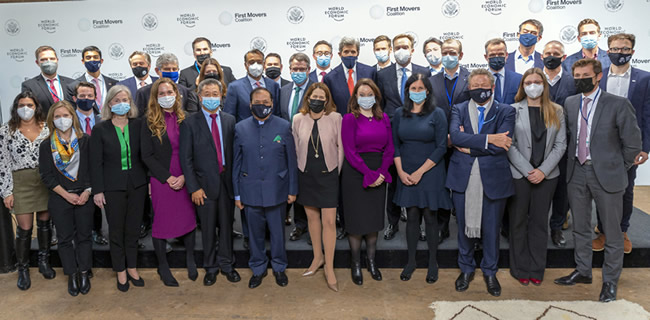
Photo: Guests and speakers at the launch session of the First Movers Coalition at COP26 in Glasgow, United Kingdom, 4 November 2021. Image provided by & copyright by World Economic Forum/Iain McLean.
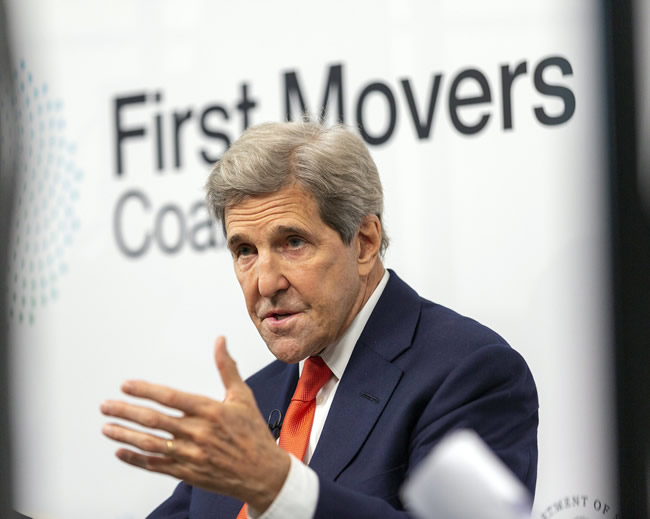
Photo: Secretary John Kerry, US Special Presidential Envoy on Climate, speaking during the launch session of the First Movers Coalition at COP26 in Glasgow, United Kingdom, 4 November 2021. Image provided by & copyright by World Economic Forum/Iain McLean.
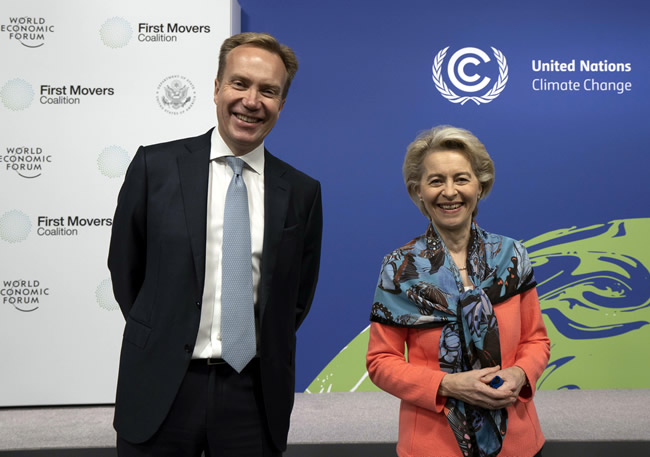
Photo: Børge Brende, President of the World Economic Forum, at the launch session of the First Movers Coalition at COP26 in Glasgow, United Kingdom, 4 November 2021. Image provided by & copyright by World Economic Forum.
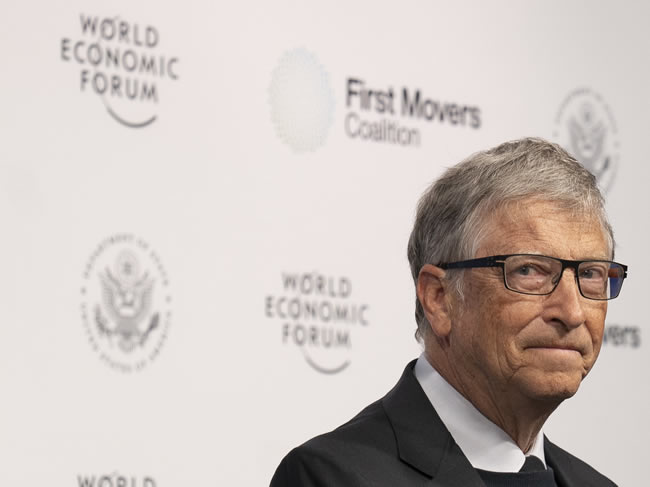
Photo: Bill Gates of the Bill & Melinda Gates Foundation at the launch session of the First Movers Coalition at COP26 in Glasgow, United Kingdom, 4 November 2021. Image provided by & copyright by World Economic Forum.
Glasgow, United Kingdom, 4 November 2021 — Roughly half of the emission reductions needed to reach the 2050 climate goals rely on technologies in early development, demonstration, or prototype phases. Accelerating innovation in this decade is critical to bringing these technologies to market and making them cost-competitive.
To jumpstart this effort, the World Economic Forum, in partnership with US Special Presidential Envoy for Climate, John Kerry, announced the First Movers Coalition - a new platform for companies to make purchasing commitments that create new market demand for low carbon technologies.
The commitments aim to be collectively significant enough to commercialize decarbonization technologies. The First Movers Coalition will create a long-term impact by driving milestones this decade through investment into these technological solutions.
It will work across eight key sectors. Seven of these sectors — steel, cement, aluminum, chemicals, shipping, aviation, and trucking—account for more than a third of global carbon emissions but do not have cost-competitive clean energy alternatives to fossil fuels. Direct air capture could reduce atmospheric carbon-dioxide levels to help achieve net-zero global emissions and require technological innovation to reach commercial viability.
The First Movers Coalition provides opportunities for a wide range of companies to make commitments, take action and build the clean and profitable supply chains of the future. It also brings together a range of civil society and expert organizations to build momentum, complement ongoing efforts, and input into the initiative’s design.
Børge Brende, President of the World Economic Forum, said: “Technology has given us the tools to reduce our emissions and build a more robust and more inclusive economy of the future. However, for innovators and investors to tackle the climate crisis, they need apparent market demand. The First Movers Coalition will leverage the collective purchasing power of leading companies and drive the need for these technologies. I call on business leaders to work with us and be the role models keeping our climate goals alive.
John Kerry, US Special Presidential Envoy for Climate, said: “The First Movers Coalition is a platform for the world’s leading global companies to make purchasing commitments to create early markets for critical technologies needed to achieve net-zero by 2050. In this critical decade, we not only need to deploy as rapidly as possible existing clean energy technologies, such as wind turbines, solar panels, and battery storage but also drive innovation for our long-term decarbonization goals.”
Phase 1 commitments launched.
These commitments target new technologies and create a market by 2030 to achieve decarbonization in 2050. Founding members have made commitments in at least one of these sectors.
• Aviation:
Members commit to using emerging technologies, including sustainable aviation fuels (SAF) with significant emissions reductions, electric and hydrogen propulsion for air travel by 2030.
Airlines and air transport companies set a target of replacing at least 5% of conventional jet fuel demand with SAF that reduces life-cycle GHG emissions by 85% or more when compared with traditional jet fuel, or using zero-carbon emitting propulsion technologies by 2030;
Airfare and air freight purchasers set a target to replace at least 5% of conventional jet fuel demand for air transport with SAF that reduces life-cycle GHG emissions by 85% or more compared with traditional jet fuel or zero-carbon emitting propulsion technologies by 2030.
• Shipping: Members commit to using zero-emission fuels in new and retrofitted zero-emission vessels by 2030.
• Trucking: Members commit to purchase or contract zero-emission medium and heavy-duty vehicles by 2030. These can include battery or fuel-cell electric vehicles and incorporate renewable sources of electricity and hydrogen for charging. Trucking owners and operators also set a target that at least 30% of their heavy-duty and 100% of their medium-duty truck purchases will be zero-emission trucks by 2030. In addition, retailers & manufacturers set a target to require all of their trucking service providers to meet the trucking owners and operators’ commitment by 2030.
• Steel: Members commit to purchasing volumes of near-zero-emissions steel by 2030. The deployment of breakthrough iron and steelmaking technology is needed to deliver a net-zero steel sector with minimal residual emissions. These technologies include direct hydrogen reduction, carbon capture use and storage, and electrolysis-based production processes. Steel purchasers set a target that at least 10% of their annual steel procurement volumes by 2030 meet or exceed the First Movers Coalition definition for near-zero emissions steel.
The remaining sectoral commitments will launch in early 2022.
Founding members
- A.P. Møller - Mærsk
- Aker ASA
- Agility
- Airbus
- Amazon
- Apple
- Bain & Company
- Bank of America
- Boston Consulting Group
- Boeing
- Cemex
- Dalmia Cement (Bharat) Limited
- Delta Air Lines
- Deutsche Post DHL Group
- ENGIE
- Fortescue Metals Group
- Holcim
- Invenergy
- Johnson Controls
- Mahindra Group
- Nokia
- Ørsted
- Salesforce
- ReNew Power
- Scania
- SSAB Swedish Steel
- Trafigura Group
- Trane Technologies
- United Airlines
- Vattenfall
- Volvo Group
- Yara International
- Western Digital
- ZF Friedrichshafen AG
Source: World Economic Forum
|GlobalGiants.Com|







Edited & Posted by the Editor | 3:29 AM | View the original post
August 24, 2021
World Economic Forum to Establish Global Centre for Urban Transformation in Detroit
Leaders from Detroit and around the world call for increased public-private collaboration to address the growing challenges facing cities
The new Centre will mobilize the global business community and key stakeholders to support cities as they chart a course for recovery from the COVID-19 pandemic
Detroit will serve as the Centre’s global headquarters, providing a model for more inclusive and sustainable urban development
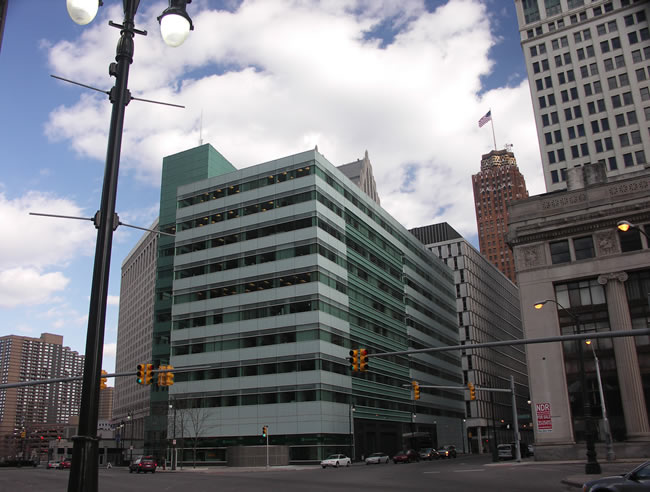
Photo: Detroit. Image credit: Sebastian Kruk.

Photo: Impressions from the World Economic Forum Annual Meeting 2020 in Davos-Klosters, Switzerland, January 20. Image provided by & copyright © World Economic Forum / Valeriano Di Domenico. [File Photo]

Photo: Impressions from the World Economic Forum Annual Meeting 2020 in Davos-Klosters, Switzerland, January 19. Image provided by & copyright © World Economic Forum/Sikarin Fon Thanachaiary. [File Photo]
Detroit, August 23, 2021 - The World Economic Forum has announced plans to establish a new global Centre for Urban Transformation headquartered in Detroit. The Centre seeks to increase public-private collaboration in cities and advance more inclusive and sustainable models for urban development.
“Around the globe, cities are facing unprecedented challenges from COVID-19 to climate change, exposing deep systemic inequities,” said Jeff Merritt, Head of Urban Transformation, World Economic Forum. “As we chart a course towards a more sustainable and equitable future, the government cannot carry this burden alone; increased public-private cooperation is essential. Detroit is uniquely positioned to serve as the epicenter for this work - a hub for urban transformation and innovation that the world can look to for guidance and inspiration.”
The World Economic Forum will leverage its global network of leading companies, governments, civil society organizations, and academic institutions to support cities as they seek to rebuild their economies and forge more resilient communities. It includes mobilizing the global business community to commit expertise and resources supporting local communities, advancing models for inclusive urban development, and exploring new approaches to expand urban services and economic opportunities in low-income and traditionally marginalized communities.
The Centre will launch in October with a series of events and announcements, showcasing innovative models of urban transformation from around the globe. Bedrock, Detroit’s largest real estate company, will host the Centre’s work in Detroit, providing a testbed to rethink and redefine the benefits and possibilities of urban living. World Economic Forum’s offices in Beijing, Geneva, Mumbai, New York, San Francisco, and Tokyo will do the additional work.
“Bedrock is excited to bring the World Economic Forum and its global platform to Detroit,” said Kofi Bonner, Chief Executive Officer, Bedrock. “This partnership provides an opportunity to showcase Detroit’s extraordinary growth and positions Michigan’s largest city and international border as a global hub for best-in-class thinking on developing a next-generation, inclusive urban economy.”
• What leaders are saying about the Centre for Urban Transformation
” By 2030, six out of every ten people in the world would reside in cities,” said Maimunah Mohd Sharif, Executive Director of UN-Habitat. “We need an urgent change in mindsets, policies, and approaches towards urbanization to ensure nobody is left behind. We look forward to working with the World Economic Forum to advance the New Urban Agenda and Sustainable Development Goal 11 to make cities inclusive, safe, resilient, and sustainable.”
“Congratulations to the City of Detroit, and thank you to all the people who championed this iconic American city as the home of the World Economic Forum Global Centre for Urban Transformation,” said Governor Gretchen Whitmer. “Michigan has led the way in bringing together public and private sectors to creatively solve issues from transportation to small business relief for decades, and Detroit is the perfect place to leverage that approach to improving urban living worldwide.”
“The World Economic Forum could have chosen any city in the world to locate its global Centre for Urban Transformation, and we are proud they chose Detroit,” said Mayor Mike Duggan. “In Detroit, we have always solved major issues and expanded opportunity through innovation and partnership, and that is what the Centre for Urban Transformation seeks to do on a global scale. So we are thrilled they will be doing it from right here in Detroit.”
“Innovation, collaboration, and talent converge in Detroit in ways that change the world, and we are proud to welcome the headquarters of the World Economic Forum Global Centre for Urban Transformation to this great city,” said Lt. Governor Garlin Gilchrist II. “We have a generational opportunity to address some of society’s most significant challenges, from racial inequity to climate change to the future of industry and mobility. This announcement puts Detroit at the forefront of what inclusive and sustainable urban development can, and should, look like across the globe.”
” As the world looks to address the defining challenges of today, it should come as no surprise it turns to Detroit,” said Maureen Donohue Krauss, President, and CEO, Detroit Regional Partnership. “This news further validates the Detroit Region’s standing as an international business hub with the talent and assets companies need to take on complex problems and thrive. The Center of Urban Transformation will not only succeed here because of everything our regional economy offers, but its presence will also strengthen our appeal as a global destination for innovation and investment for our future.”
“The rethinking of cities can bring about a future of urban living that’s better for all of us,” said Jonathan Hursh, Founding Partner, Utopia. “Public-private partnerships are central to this transformation as these cities find their unique path forward. The Centre will be a critical platform to bring all the pieces together.”
“Building an inclusive economy in Detroit is a priority for the DEGC, and we embrace new partners that are equally committed to creating a major metropolitan city where everyone can thrive,” said Kevin Johnson, President, and CEO, Detroit Economic Growth Corporation (DEGC). “Whether its small business or large corporations, our focus is on overcoming the barriers to access- be it capital, education, real estate, or jobs - and support from a global resource like the WEF will create new opportunities for solutions. We are looking forward to working together on advancing Detroit.”
“Tremendous energy is building around the world to build back better - with greater equity, resilience, and sustainability,” said Stephen Zoegall, Lead for Global Cities, Transport and Infrastructure, Accenture. “We are excited to continue our collaboration with the Centre and Forum to help convert ambition into reality.”
Source: World Economic Forum
|GlobalGiants.Com|







Edited & Posted by the Editor | 4:32 AM | View the original post
July 9, 2021
Poll shows Social Distancing and Masks to Continue despite COVID-19 Vaccination.
Experts say variants are likely causing people to proceed with caution as survey shows more than 75% to continue wearing a mask and practicing social distancing even after COVID-19 Vaccination.
Germany and the U.S. have enormous proportions saying they will not continue wearing a mask.
Confidence in returning to restaurants, sporting events, and flying varies widely between countries. For example, only 1 in 3 in Japan will attend sporting events, while nearly all Italians are ready to eat in restaurants.
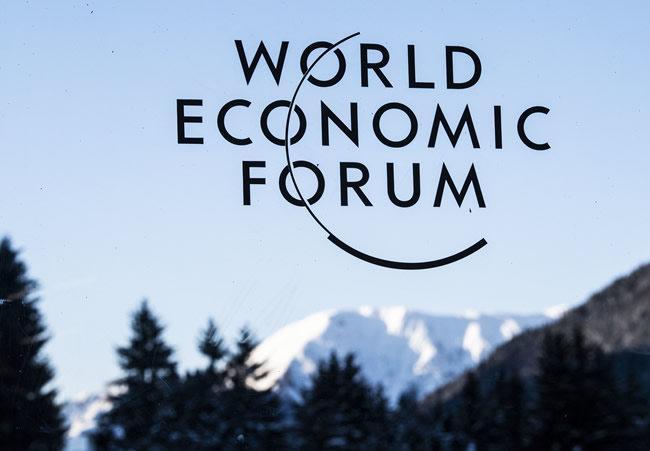
Photo: Impressions from the World Economic Forum Annual Meeting 2020 in Davos-Klosters, Switzerland, 20 January. Image provided by & Copyright © World Economic Forum / Valeriano Di Domenico.
Geneva, Switzerland, July 8, 2021 — A majority of adults said they are likely to continue socially distancing and wearing a mask in public even if they are vaccinated against COVID-19. However, there is mixed confidence across countries in returning to sporting events, eating in restaurants, flying, and using public transport.
These findings come from a new IPSOS/World Economic Forum survey that polled some 12,500 people. They conducted it between June 3-6, 2021, in Brazil, France, Germany, Italy, Japan, Mexico, Spain, the United Kingdom, and the United States.
In each of these nine countries, more than 75% say that assuming they have received a vaccine for COVID-19, they definitely will continue or may continue socially distancing from others in public places. Depending on the country, between six and eight in ten say they definitely will continue or may continue wearing a mask in public.
Genya Dana, Head of Health and Healthcare at the World Economic Forum, said: “The spread of the delta variant is likely causing people to take a pause and proceed with caution. In this dynamic and changing public health situation, it is even more important for trusted sources to be providing timely and locally relevant information.”
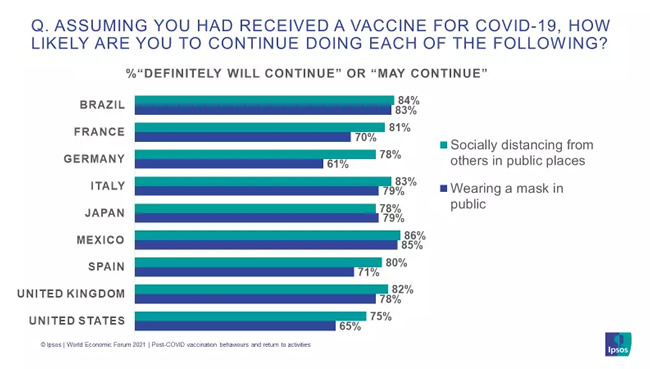
Graphic: IPSOS/World Economic Forum
Levels of certainty about continued social distancing and mask-wearing in public places vary across countries:
· More than half of those surveyed in Brazil and just under half in Italy, the U.K., France, Mexico, and Germany say they definitely will continue social distancing in public places, compared to only one-third in Japan and the U.S. However, the U.S. shows the highest proportion saying that they will not continue or haven’t been socially distancing pre-vaccination (22%).
· Gaps are even wider when it comes to mask-wearing in public: 57% in Brazil say they definitely will continue, compared to 27% in Germany. Germany and the U.S. have the most considerable proportions saying they will not continue or haven’t been wearing a mask (32% both).
• Confidence about returning to various activities
How soon one feels confident resuming different activities after receiving a vaccine for COVID-19 varies widely by type of activity and country. For most activities measured, confidence tends to be most prevalent in Mexico, followed by Spain, Italy, and France, and lowest in Japan.
For relatively common or frequent activities, proportions of those saying they would do so immediately or in a few months range from:
· 59% in Japan to 82% in Italy for eating in restaurants,
· 48% in the U.S. to 67% in Mexico for using public transit, and
· 38% in Japan to 62% in Mexico for attending sports events or concerts.
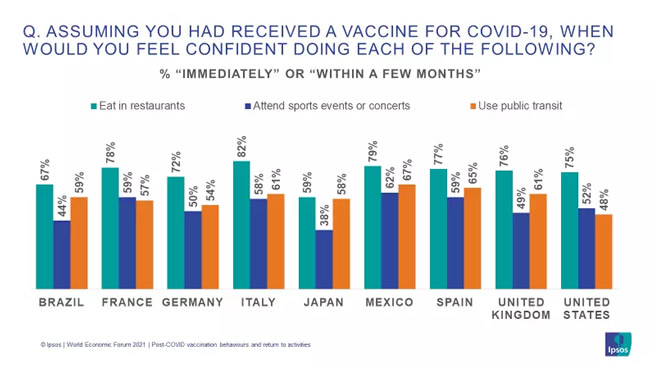
Graphic: IPSOS/World Economic Forum
When it comes to flying, proportions of those saying they would do so immediately or in a few months vary depending on their home country and the destination. They range from:
· 38% in Japan to 72% in Mexico for flying with one’s own country,
· 24% in Japan to 68% in Mexico for flying to other countries where the vaccine is available, and
· 17% in Japan to 52% in Mexico for flying to other countries where the vaccine is not yet available.
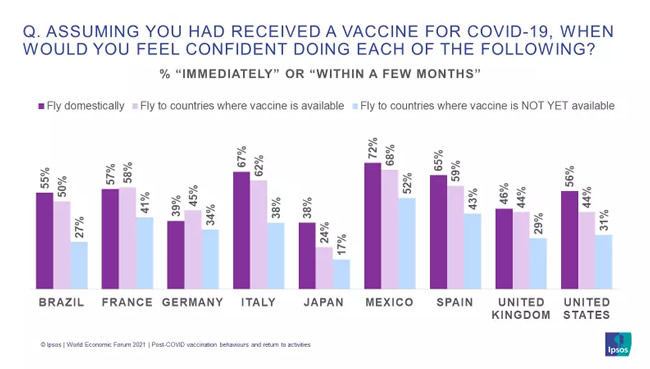
Graphic: IPSOS/World Economic Forum
These are the results of an Ipsos survey conducted June 3 to 6, 2021, on the Global Advisor online platform among adults aged 18-74 in the United States and 16-74 in Brazil, France, Germany, Italy, Spain, Japan, Mexico, and the United Kingdom. Where results do not sum up to 100 or the ‘difference’ appears to be +/-1 more/less than the actual, this may be due to rounding, multiple responses, or the exclusion of “don’t know” or not stated responses.
IPSOS is the world’s third-largest market research company, present in 90 markets and employing more than 18,000 people. Founded in France in 1975, it serves more than 5000 clients across the globe with 75 business solutions.
Sources: IPSOS, World Economic Forum
|GlobalGiants.Com|







Edited & Posted by the Editor | 1:28 AM | View the original post
February 4, 2021
World Economic Forum appoints New Member to Board of Trustees
• Julie Sweet joins the World Economic Forum Board of Trustees.
• The Board of Trustees is the guardian of the World Economic Forum’s mission and values.
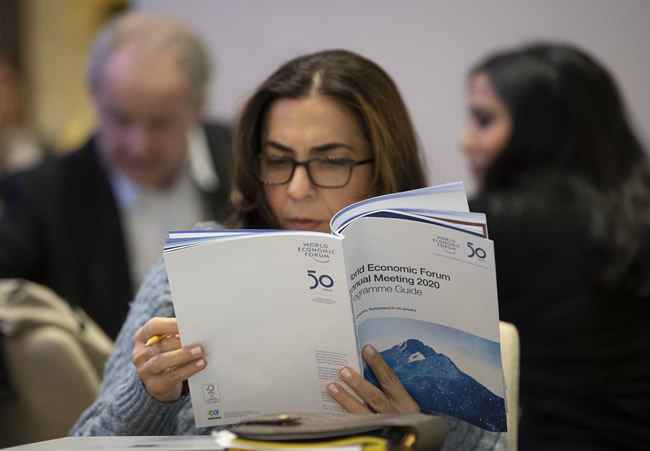
Photo: Impressions from the World Economic Forum Annual Meeting 2020 in Davos-Klosters, Switzerland, 20 January 2020. Image provided by & copyright © World Economic Forum / Valeriano Di Domenico.
Geneva, Switzerland, 4 February 2021 - The Chief Executive Officer of Accenture, Julie Sweet, will join the Board of Trustees of the World Economic Forum. Sweet’s track record of success and commitment to enhancing gender diversity in business will significantly contribute to strengthening the Forum in its mission of improving the world’s state.
The Board of Trustees, the highest governing body of the World Economic Forum, is responsible for its strategy and advancing its values. As a reflection of its multistakeholder status, membership is divided equally between representatives of the business community and leaders from government, international organizations, and civil society.
“The World Economic Forum is delighted to welcome Julie Sweet to its Board of Trustees. We look forward to working with her to deliver on the Forum’s commitment to advancing stakeholder capitalism and contributing to more resilient and equitable societies,” said Klaus Schwab, Founder and Executive Chairman of the World Economic Forum.
“Collaboration between the world’s governments, businesses, and cultural leaders has never been more critical,” said Julie Sweet, Chief Executive Officer, Accenture. “I am honored to join the board of the World Economic Forum and help advance its work to find shared and actionable solutions to our most pressing issues while shaping a more inclusive and sustainable future for all.”
Julie Sweet is CEO of Accenture and serves on the company’s board of directors. Before becoming CEO in 2019, she served as CEO of Accenture’s business in North America and as Accenture’s general counsel, secretary, and chief compliance officer for five years. Before joining Accenture in 2010, Sweet was a partner for ten years in Cravath, Swaine & Moore LLP.
Outside Accenture, Sweet is a leader in innovation, technology’s impact on business, and inclusion and diversity. She serves on the board of directors for the Business Roundtable, where she is Chair of its Technology Committee. She also serves on the board of directors for Catalyst.
As of 3 February 2021, the Members of the Board of Trustees of the World Economic Forum are:
- Klaus SCHWAB - Chairman of the Board of Trustees, World Economic Forum
- Peter BRABECK-LETMATHE - Vice-Chairman of the Board of Trustees, World Economic Forum, Chairman Emeritus, Nestlé SA, Switzerland
- H.M. Queen Rania AL ABDULLAH of the Hashemite Kingdom of Jordan
- Mukesh AMBANI - Chairman and Managing Director, Reliance Industries, India
- Marc R. BENIOFF - Chairman and Chief Executive Officer, Salesforce, USA
- Thomas BUBERL - Chief Executive Officer, AXA, France
- Mark CARNEY - Finance Adviser on the 26th Conference of the Parties to the Prime Minister of the United Kingdom
- Laurence FINK - Chairman and Chief Executive Officer, BlackRock, USA
- Chrystia FREELAND - Deputy Prime Minister and Minister of Finance of Canada
- Orit GADIESH - Chairman, Bain & Company, USA
- Kristalina GEORGIEVA - Managing Director, International Monetary Fund, Washington DC
- Fabiola GIANOTTI - Director-General, European Organization for Nuclear Research (CERN)
- Al GORE - Vice-President of the United States (1993-2001); Chairman and Co-Founder, Generation Investment Management LLP, USA
- Herman GREF - Chairman of the Board and Chief Executive Officer, Sberbank, Russia
- Angel GURRÃA - Secretary-General, Organisation for Economic Co-operation and Development
- André S. HOFFMANN - Non-Executive Vice-Chairman, Roche Holding Ltd., Switzerland
- Paula INGABIRE - Minister of Information Communication Technology and Innovation of Rwanda
- Christine LAGARDE - President, European Central Bank
- Jack MA - Alibaba Board of Directors, Alibaba Group, People’s Republic of China
- Yo-Yo MA - Cellist
- Peter MAURER - President, International Committee of the Red Cross (ICRC), Switzerland
- Luis Alberto MORENO - President, Inter-American Development Bank, Washington DC (2005-2020)
- Patrice MOTSEPE - Founder and Executive Chairman, African Rainbow Minerals, South Africa
- L. Rafael REIF - President, Massachusetts Institute of Technology (MIT), USA
- David M. RUBENSTEIN - Co-Founder and Co-Executive Chairman, Carlyle Group, USA
- Mark SCHNEIDER - Chief Executive Officer, Nestlé, Switzerland
- Tharman SHANMUGARATNAM - Senior Minister, Singapore
- Jim Hagemann SNABE - Chairman, Supervisory Board, Siemens AG, Germany; Chairman, A.P. Møller-Maersk, Denmark
- Julie SWEET - Chief Executive Officer, Accenture, Ireland
- Feike SYBESMA - Honorary Chairman, Royal DSM, Netherlands
- Heizo TAKENAKA - Minister of State for Economic and Fiscal Policy of Japan (2002-2006)
- Min ZHU - President, National Institute of Financial Research, People’s Republic of China
Source: World Economic Forum
|GlobalGiants.Com|







Edited & Posted by the Editor | 11:32 AM | View the original post
January 27, 2021
Global Business Leaders Support Environmental, Social and Governance (ESG) Convergence by Committing to Stakeholder Capitalism Metrics.
61 business leaders, including members of the World Economic Forum and its International Business Council (IBC), have committed to the core Stakeholder Capitalism Metrics released by the IBC.
Stakeholder Capitalism Metrics offer a set of universal, comparable disclosures focused on people, planet, prosperity, and governance that companies can report on, regardless of industry or region.
The move signals that private sector leaders view environmental, social, and governance factors as critical to the success and long-term viability of all businesses, and a unified voice is gathering pace on a global solution for non-financial reporting.

Photo: Impressions from downtown at the Annual Meeting 2019 of the World Economic Forum in Davos, January 21, 2019. Image provided by & copyright © World Economic Forum / Walter Duerst.
Geneva, Switzerland January 26, 2021 - A growing coalition of 61 top business leaders across industries announced today their commitment to the Stakeholder Capitalism Metrics, a set of environmental, social, and governance (ESG) metrics and disclosures released by the World Economic Forum and its International Business Council (IBC) in September 2020, that measure the long-term enterprise value creation for all stakeholders.
The Stakeholder Capitalism Metrics, drawn from existing voluntary standards, offer a core set of 21 universal, comparable disclosures focused on people, planet, prosperity, and principles of governance. They are considered most critical for business, society, and the earth, and that companies can report on regardless of industry or region. They strengthen companies and investors’ ability to benchmark progress on sustainability matters, thereby improving decision-making and enhancing transparency and accountability regarding the shared and sustainable value companies create, WEF elaborated.
These leaders and their organizations, including Dow, Unilever, Nestlé, PayPal, Reliance Industries, and Sony, have today committed to:
Reflect the core metrics in their reporting to investors and other stakeholders (e.g., annual report, sustainability report, proxy statements, or other materials) by reporting on the metrics most relevant to their business or briefly explaining why a different approach is more appropriate.
Publicly support this work and encourage their business partners to do so.
Promote the further convergence of existing ESG standards, frameworks, and principles to support progress towards a globally accepted solution for non-financial reporting on standard ESG metrics.
In making these commitments, business leaders signify that ESG factors are increasingly critical to all businesses’ success and long-term viability. It reflects leading global companies’ intent to integrate sustainability into their core strategy, operations, and corporate disclosures.
“Stakeholder capitalism becomes now really mainstream,” said Klaus Schwab, Founder and Executive Chairman, World Economic Forum. “The public commitments from companies to report not only on financial matters but also their ESG impacts are an important step towards a global economy that works for progress, people and the planet.”
“We have to deliver great returns for our shareholders and help drive progress on society’s most important priorities,” said Brian Moynihan, Chairman and CEO of Bank of America and Chairman of the International Business Council. “That is stakeholder capitalism in action. Common metrics will help all stakeholders measure the progress we are making and ensure that the resources capitalism can marshal - from companies, from investors, and others - are directed to where they can make the most difference.”
The World Economic Forum, in collaboration with Bank of America, Deloitte, EY, KPMG, and PwC, curated the set of 21 core and 34 expanded metrics over the past two years with the support of over 140 stakeholders.
The metrics include non-financial disclosures centered around the four pillars: people, planet, prosperity, and governance principles. Intentionally built on existing standards, the posts include metrics such as greenhouse gas emissions, pay equality, and board diversity.
By adopting and reporting these metrics and disclosures, the business community will continue to catalyze greater cooperation and alignment among existing standards and encourage progress in developing a systemic, globally accepted set of common standards for reporting sustainability performance.
The full list of companies that have agreed to implement reporting on the Stakeholder Capitalism Metrics includes:
- Accenture
- Adecco Group
- African Rainbow Minerals
- Allianz
- Banco Santander
- Bank of America
- BBVA
- Boston Consulting Group
- bp
- Clifford Chance
- Credit Suisse
- Dell Technologies
- Deloitte
- Deutsche Post DHL
- Dow
- Eni
- Ecolab
- Ecopetrol
- Equinor
- EY
- Fidelity International
- HEINEKEN
- HP
- HSBC Holdings
- IBM
- JLL
- Kearney Inc.
- KPMG
- Mahindra Group
- Majid Al Futtaim
- Mastercard
- McKinsey & Company
- Medtronic
- Mercuria Energy Group
- Mitsubishi Corporation
- Mitsubishi UFJ Financial Group Inc.
- Nestlé
- Novo Nordisk A/S
- Palo Alto Networks
- PayPal
- Publicis Groupe
- PwC
- Reliance Industries
- Repsol
- Royal DSM
- Royal Dutch Shell
- Royal Philips
- Salesforce
- Schneider Electric
- Siemens
- Solvay
- Sony
- Sumitomo Corporation
- Sumitomo Mitsui Financial Group (SMFG)
- Suntory Holdings
- Takeda Pharmaceutical
- Total
- UBS
- Unilever
- Yara International
- Zurich Insurance Group
“Runaway climate change, environmental degradation, and social inequality are some of the biggest problems that the world faces,” said Alan Jope, CEO of Unilever. “Companies’ annual reports and accounts might not be the first mechanism for change that would spring to mind, but standardized and mandatory non-financial reporting is critical to creating a new form of capitalism that tackles these problems. The Forum’s IBC work is an important step forward, and we are providing our wholehearted support.”
The Davos Agenda is a pioneering mobilization of global leaders to rebuild trust to shape the principles, policies, and partnerships needed in 2021. It features a full week of international programming dedicated to helping leaders choose innovative and bold solutions to stem the pandemic and drive a robust recovery over the next year. Heads of state, CEOs, civil society leaders, and global media will actively participate in almost 100 sessions across five themes.
Source: World Economic Forum
|GlobalGiants.Com|







Edited & Posted by the Editor | 3:54 AM | View the original post
January 18, 2021
World Economic Forum: World Leaders to Meet During Davos Agenda in a Crucial Year to Rebuild Trust.
The Davos Agenda 2021 will convene under the theme: A Crucial Year to Rebuild Trust.
The World Economic Forum will gather the world’s foremost leaders to address the economic, environmental, social, and technological challenges following the COVID-19 pandemic.
More than 1,500 business, government, and civil society leaders from over 70 countries will set the agenda for a critical year ahead and discuss how to catalyze impact in the rapidly advancing Fourth Industrial Revolution.
The Davos Agenda week’s conclusions will feed into task forces working on global issues for the upcoming Special Annual Meeting in Singapore.
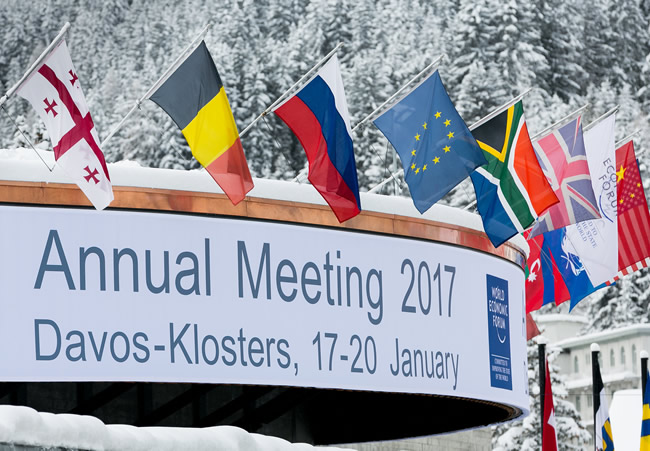
Photo: Impressions from the Annual Meeting 2017. The Conference Center from the outside. At the Annual Meeting 2017 of the World Economic Forum in Davos, January 15, 2017. Image provided by & copyright © World Economic Forum / Benedikt von Loebell. [File Photo]
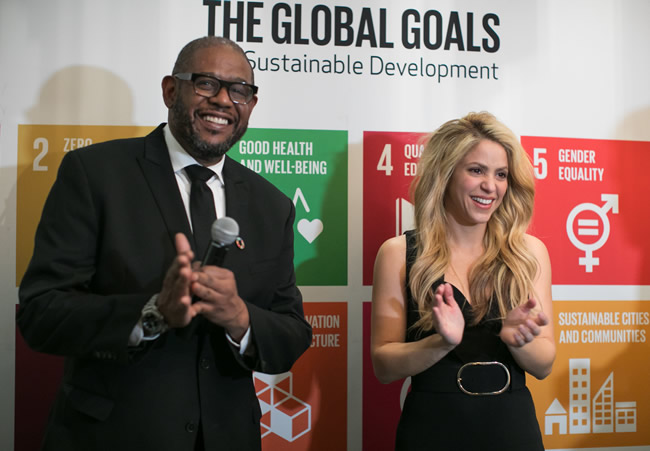
Photo: Actor Forest Whitaker and Popstar Shakira at the Media Welcome Reception at the Annual Meeting 2017 of the World Economic Forum in Davos, January 16, 2017. Image provided by & copyright © World Economic Forum / Ciaran McCrickard. [File Photo]
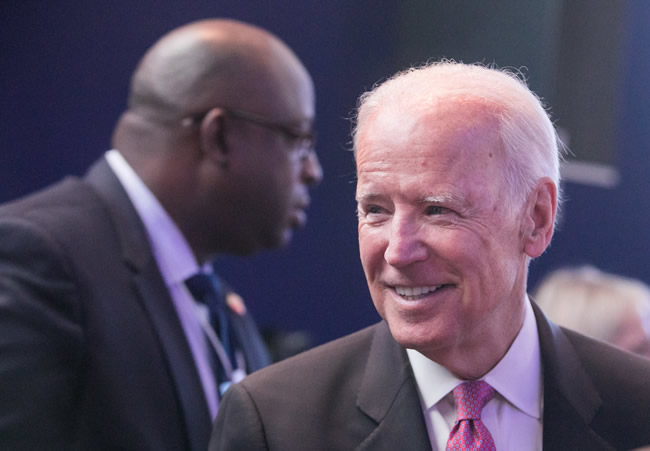
Photo: Joe Biden, Vice President of the United States at the Annual Meeting 2017 of the World Economic Forum in Davos, January 17, 2017. Image provided by & copyright © World Economic Forum / Ciaran McCrickard. [File Photo]

Photo: Opening Performance at the Annual Meeting 2018 of the World Economic Forum in Davos, January 22, 2018. Image provided by & copyright © World Economic Forum / Valeriano Di Domenico. [File Photo]
Geneva, Switzerland, January 18, 2021 - The World Economic Forum Davos Agenda, taking place virtually on 25-29 January, will bring together the world’s foremost leaders to address the new global situation. Heads of state and government, chief executives, and civil society leaders will convene under the theme: A Crucial Year to Rebuild Trust.
The meeting will create impact, rebuild Trust, and shape the policies and partnerships needed in 2021.
“In the context of the COVID-19 pandemic, the need to reset priorities and the urgency to reform systems have been growing stronger around the world,” said Klaus Schwab, Founder and Executive Chairman of the World Economic Forum. “Rebuilding trust and increasing global cooperation are crucial to fostering innovative and bold solutions to stem the pandemic and drive a robust recovery. This special meeting will be an opportunity for leaders to outline their vision and address the most important issues of our time, such as the need to accelerate job creation and to protect the environment.”
The COVID-19 pandemic has demonstrated that no institution or individual alone can address our complex, interdependent world’s economic, environmental, social, and technological challenges. The pandemic has accelerated systemic changes that were apparent before its inception. The fault lines that emerged in 2020 now appear as critical crossroads in 2021. The Davos Agenda will help leaders choose innovative and bold solutions to stem the pandemic and drive a robust recovery over the next year, the WEF announcement stated.
The five program themes are:
Designing cohesive, sustainable, resilient economic systems (January 25).
Driving responsible industry transformation and growth (January 26).
Enhancing the stewardship of the global commons (January 27).
Harnessing the technologies of the Fourth Industrial Revolution (January 28).
Advancing global and regional cooperation (January 29).
Addresses from G20 heads of state and government and international organizations will provide crucial insights into a range of essential issues in the year ahead. Participants will hear first-hand how these public figures will demonstrate leadership and drive action in areas such as the environment, jobs, and advances in innovation brought by the Fourth Industrial Revolution.
Heads of state and government include:
- Xi Jinping, President of the People’s Republic of China;
- Narendra Modi, Prime Minister of India;
- Yoshihide Suga, Prime Minister of Japan;
- Emmanuel Macron, President of France;
- Angela Merkel, Federal Chancellor of Germany;
- Ursula von der Leyen, President of the European Commission;
- Giuseppe Conte, Prime Minister of Italy;
- Moon Jae-in, President of the Republic of Korea;
- Alberto Fernández, President of Argentina;
- Cyril Ramaphosa, President of South Africa;
- Pedro Sánchez, Prime Minister of Spain;
- Guy Parmelin, President of the Swiss Confederation and Federal Councillor for Economic Affairs, Education and Research;
- Ivan Duque, President of Colombia;
- Carlos Alvarado Quesada, President of Costa Rica;
- Nana Addo Dankwa Akufo-Addo, President of the Republic of Ghana;
- Kyriakos Mitsotakis, Prime Minister of Greece;
- Benjamin Netanyahu, Prime Minister of Israel;
- Abdullah II ibn Al Hussein, King of the Hashemite Kingdom of Jordan;
- Paul Kagame, President of Rwanda;
- Lee Hsien Loong, Prime Minister of Singapore.
Many other world leaders may confirm later.
Leaders from international organizations, government agencies, and central banks include:
- António Guterres, Secretary-General, United Nations (UN);
- Tedros Adhanom Ghebreyesus, Director-General, World Health Organization (WHO);
- Kristalina Georgieva, Managing Director, International Monetary Fund (IMF);
- Amina Mohammed, Deputy Secretary-General, United Nations (UN);
- Achim Steiner, Administrator, United Nations Development Programme (UNDP);
- Phumzile Mlambo-Ngcuka, Undersecretary-General, and Executive Director, United Nations Entity for Gender Equality and the Empowerment of Women (UN WOMEN);
- Dongyu Qu, Director-General, Food, and Agriculture Organization of the United Nations (FAO);
- Inger Andersen, Executive Director, United Nations Environment Programme (UNEP);
- Henrietta Fore, Executive Director, United Nations Children’s Fund (UNICEF);
- David Beasley, Executive Director, United Nations World Food Programme (WFP);
- Fang Liu, Secretary-General, International Civil Aviation Organization (ICAO);
- Anthony Fauci, Director, National Institute of Allergy and Infectious Diseases, National Institutes of Health, USA;
- Angel GurrÃa, Secretary-General, Organisation for Economic Co-operation and Development (OECD);
- Mauricio Claver-Carone, President, Inter-American Development Bank (IDB);
- Guy Ryder, Director-General, International Labour Organization (ILO);
- Jürgen Stock, Secretary-General, International Criminal Police Organization (INTERPOL);
- Fatih Birol, Executive Director, International Energy Agency (IEA);
- Rebecca Fatima Sta Maria, Executive Director, APEC Secretariat (Asia-Pacific Economic Cooperation).
- Christine Lagarde, President, European Central Bank;
- François Villeroy de Galhau, Governor of the Central Bank of France;
- Andrew Bailey, Governor of the Bank of England.
More than 1,000 leaders from the Forum’s member and partner organizations will represent the private sector. Seven of the top ten companies by market capitalization are engaged year-round with the Forum, and many will participate in The Davos Agenda week. As a working meeting to advance ongoing project work, more than 500 chief executives and chairpersons will participate in sessions throughout the week.
Leaders from civil society are a critical voice in shaping the agenda. Those taking part in the meeting include:
- Seth Berkley, Chief Executive Officer, Gavi, the Vaccine Alliance;
- Gabriela Bucher, Executive Director, Oxfam International;
- Sharan Burrow, General Secretary, International Trade Union Confederation (ITUC);
- Hindou Oumarou Ibrahim, President, Association for Indigenous Women and Peoples of Chad (AFPAT);
- Marco Lambertini, Director-General, WWF International;
- Laura Liswood, Secretary-General, Council of Women World Leaders;
- Delia Ferreira Rubio, Chair, Transparency International;
- Peter Sands, Executive Director, Global Fund to Fight AIDS, Tuberculosis, and Malaria . Drawn from over 10,000 civic-minded young leaders, members of the World Economic Forum’s Global Shapers, Young Global Leaders, Technology Pioneers, and Social Entrepreneurs communities will bring unique perspectives to The Davos Agenda.
• Flagship reports, initiatives, and the latest book on Stakeholder Capitalism
On January 25, Professor Schwab will release his latest book, titled “Stakeholder Capitalism: A Global Economy that Works for Progress, People and Planet.”
The World Economic Forum will release its Global Risks Report 2021 on January 19. The flagship report is an important marker for prioritizing public and private sectors in the year ahead.
The Davos Agenda will also mark the launch of several World Economic Forum initiatives to accelerate the race to net-zero emissions, champion new standards for racial justice, develop artificial intelligence ethically in the global public interest, and close the digital divide.
The official program of The Davos Agenda will begin on January 25.
Source: World Economic Forum
|GlobalGiants.Com|







Edited & Posted by the Editor | 2:33 PM | View the original post
December 10, 2020
"Agile Nations" Sign First Agreement to Unlock Potential of Emerging Tech
Canada, Denmark, Italy, Japan, Singapore, UAE, and UK sign world’s first “Agile Nations” agreement at a panel co-organized by the World Economic Forum.
The agreement paves the way for the seven nations to help innovators navigate their rules, test new ideas with regulators, and scale them across their markets.
Collaboration builds on the World Economic Forum and OECD efforts to support more effective technological innovation regulation in the Fourth Industrial Revolution.
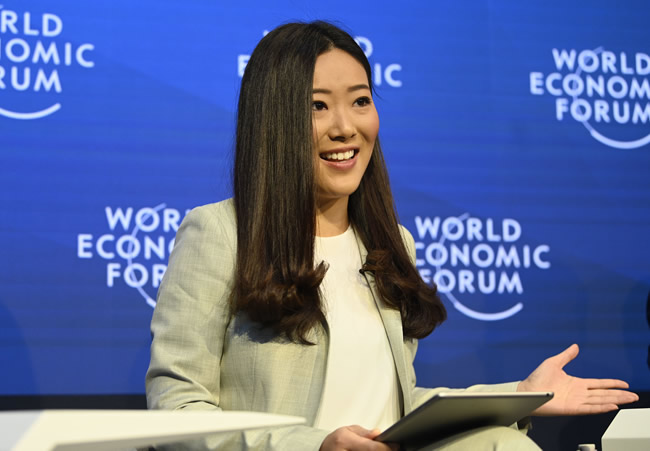
Photo: Olivia Chang, Anchor, CNNMoney Switzerland, Switzerland, speaking in Investing in the Next Digital Frontier session at the World Economic Forum Annual Meeting 2020 in Davos-Klosters, Switzerland, 24 January. Image provided by & copyright © World Economic Forum / Valeriano Di Domenico.
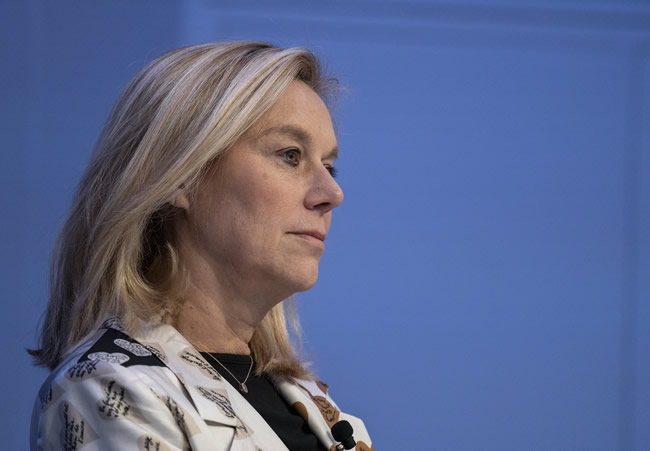
Photo: Sigrid Kaag, Minister for Foreign Trade and Development Cooperation of the Netherlands in the “The Return of Arab Unrest” session at the World Economic Forum Annual Meeting 2020 in Davos-Klosters, Switzerland, 23 January. Image provided by & copyright © World Economic Forum/Faruk Pinjo.
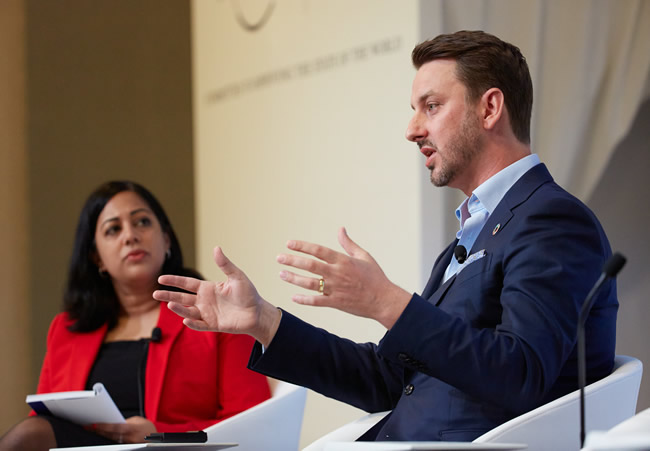
Photo: Participants speaking in the Ending Modern Slavery session at the World Economic Forum Annual Meeting 2020, Open Forum, in Davos-Klosters, Switzerland, 23 January. Image provided by & copyright © World Economic Forum/ Patrick Somelet.
Geneva, Switzerland, 9 December 2020 - The COVID-19 pandemic has wrought economic and social disruption worldwide. As people and businesses focus on recovery, governments must ensure that outdated regulations do not hold back innovation that will power economic growth and solve the world’s most pressing social and environmental challenges.
World Economic Forum and the Organisation for Economic Co-operation and Development (OECD) organized a panel for Agile Nations. The ministers from Canada, Denmark, Italy, Japan, Singapore, United Arab Emirates, and the United Kingdom announced their plan to lead the world in fostering responsible innovation and entrepreneurship. The Agile Nations Charter sets out each country’s commitment to creating a regulatory environment in which new ideas can thrive.
In a world-first, the agreement paves the way for the nations to cooperate in helping innovators navigate each country’s rules, test new ideas with regulators, and scale them across the seven markets. Priority areas for cooperation include the green economy, mobility, data, financial and professional services, and medical diagnosis and treatment.
The collaboration results from the World Economic Forum’s project on Agile Regulation for the Fourth Industrial Revolution.
The World Economic Forum today published its guide to better regulation of emerging technologies, developed in partnership with the Global Future Council on Agile Governance.
The OECD launched the development of principles on effective and innovation-friendly rulemaking in the Fourth Industrial Revolution for its 37 member states, to be adopted in 2021.
“Too often, rules and laws are designed with the past in mind,” said Murat Sönmez, Managing Director, World Economic Forum. “Our Centres for the Fourth Industrial Revolution help governments, businesses, and citizens co-design for the future - enabling the innovation that will be needed to create jobs, maintain competitiveness, and ensure resilience to shocks. We’re excited to work with the new Agile Nations network.”
“Against a backdrop of a once-in-a-century global health and economic crisis, governments need to undertake a paradigm shift in their rulemaking activities,” said Jeffrey Schlagenhauf, Deputy Secretary-General, OECD. “To help governments navigate the challenges and develop more agile approaches to the regulatory governance of innovation, the OECD is developing principles on effective and innovation-friendly rulemaking in the Fourth Industrial Revolution. The Agile Nations network is an extremely timely initiative to truly foster international regulatory cooperation for better, innovation-friendly, and up-to-date regulations worldwide.”
“The UK has a proud history of entrepreneurship and discovery, but it is only by working together internationally that we can truly unleash the incredible potential of new technology,” said Martin Callanan, Business Minister, United Kingdom. “The Agile Nations will boost collaboration to remove regulatory barriers, ensuring innovators and entrepreneurs can market and scale their innovations across all seven nations involved, and I urge other countries to join this important initiative.”
“Canada’s endorsement of the Agile Nations agreement demonstrates our commitment to creating a regulatory environment where innovation can flourish. And our respective businesses can be more efficient and competitive globally,” said Jean-Yves Duclos, President of the Treasury Board of Canada. “Canada is ready to play its part in sharing ideas and best practices on agile regulation.”
“As an international company, Siemens has always supported cross-border collaboration,” said Torsten Ende, Head of Government Affairs, Siemens. “Cross-border collaboration of regulators is the best way to avoid unnecessary divergence that could hamper innovation and to ensure future-oriented cooperation and technology with purpose. The proposed Agile Nations network, which fosters cooperation on rulemaking, is a great step in the right direction.”
“Regulatory agility, strong business-government partnerships, and constructive international regulatory cooperation are key in enabling innovation and helping businesses to emerge stronger from the COVID-19 pandemic,” said Low Yen Ling, Minister of Trade and Industry, Singapore. “Singapore looks forward to working closely with the Agile Nations network to strengthen collaboration in agile regulation to enable businesses and emerging innovations to rapidly scale up, offer new solutions, and drive greater growth.”
“We fully support this Agile Nations network as an initiative to promote international cooperation regarding the concept of ‘governance innovation’ agreed at the 2019 G20 Ministerial Meeting held in Japan. We are happy to share our experiences and knowledge about innovative governance, including projects of the Digital Architecture Design Centre established this year,” said Kouichi Munekiyo, Parliamentary Vice-Minister, Ministry of Economy, Trade, and Industry of Japan.
“IBM is pleased to support the Agile Nations initiative,” said Christopher Padilla, Vice-President, Government, and Regulatory Affairs, IBM. “Even as breakthroughs in technology are creating immense opportunities and improving economic and social well-being, these innovations are challenging traditional models of regulation. Promoting agile governance is a key mechanism for ensuring we reap technology’s benefits while mitigating risks. The Agile Nations Charter is an important step in fostering the international cooperation necessary to deliver on the promises of the Fourth Industrial Revolution.”
“Sperimentazione Italia (Italy Experimentation) allows companies, universities, and research institutions to experiment with frontier innovations, so that disruptive innovations’ opportunities are not missed. The time is ready to extend and apply the testing of ‘agile regulation’ within the international cooperation among countries,” said Paola Pisano, Minister of Technological Innovation, Italy.
“The UAE government is proud to endorse the Agile Nations network. It would help adopt agile governance and innovation to build strong, capable, and resilient governments. It would enable them to tackle future challenges with proactive solutions,” said Ohood Bint Khalfan Al Roumi, Minister of State for Government Development the Future, United Arab Emirates.
“New technologies can accelerate the transition to a more green and sustainable society,” said Katrine Winding, Director-General, Danish Business Authority. “However, regulatory and other barriers currently prevent start-ups and innovative SMEs in particular from bringing their ideas to market. Through innovation-friendly regulation, we will support the testing and developing of new solutions, ensuring equal competition, and protecting our citizens and the environment. It is no simple task. Denmark looks forward to addressing key challenges through the Agile Nations network.”
Source: World Economic Forum
|GlobalGiants.Com|







Edited & Posted by the Editor | 4:14 AM | View the original post
November 25, 2020
World Economic Forum: Global leaders to shape the Davos Agenda ahead of ‘the crucial year to rebuild trust.’
The world has experienced unimaginable hardship since the global pandemic outbreak, reversing gains in the fight against unemployment, climate change, and poverty.
Rebuilding trust and increasing global cooperation are crucial to implementing the bold and innovative solutions needed to drive a robust recovery.
To mobilize government, business, and civil society on these solutions, the World Economic Forum will hold a virtual meeting on 25-29 January 2021 on the Davos Agenda.
Heads of state and government will address the state of the world in 2021 to audiences in Asia, Europe, Africa, the Middle East, North America, and Latin America.
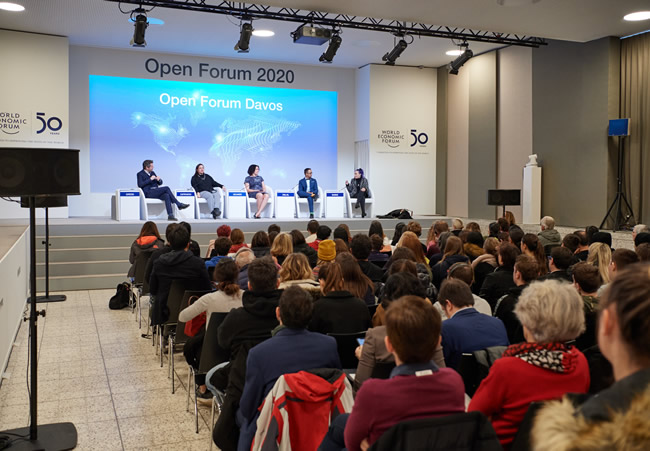
Photo: Participants in the Digital Safety for Youth session at the World Economic Forum Annual Meeting 2020, Open Forum, in Davos-Klosters, Switzerland, 24 January. Swiss Alpine High School Auditorium. Image provided by @ copyright World Economic Forum/ Marc Forzi.
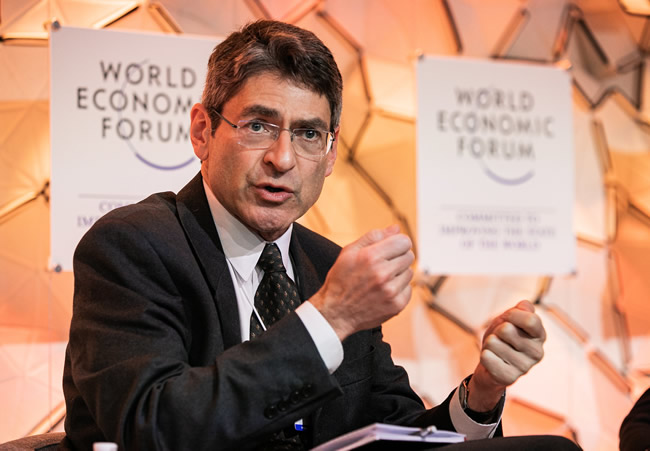
Photo: Jonathan Haskel, Professor of Economics, Imperial College London, United Kingdom, speaking during the session Accounting for Human Capital at the World Economic Forum Annual Meeting 2020 in Davos-Klosters, Switzerland, 24 January. Congress Centre - in Salon. Image provided by @ copyright World Economic Forum/Jakob Polacsek.
Geneva, Switzerland, 23 November 2020 - The Davos Agenda is a pioneering mobilization of global leaders to rebuild trust to shape the principles, policies, and partnerships needed in 2021. The virtual meeting will build momentum ahead of the Special Annual Meeting in the spring. The Davos Agenda will feature a full week of global programming on 25-29 January 2021 with the participating heads of state, CEOs, civil society leaders, international media, and youth leaders from Asia, Europe, Africa, the Middle East, North America, and Latin America.
“2021 is a crucial year to rebuild trust,” said Professor Klaus Schwab, Founder and Executive Chairman of the World Economic Forum. “The world is at a crossroads. The pandemic has reversed essential gains in the global fight against unemployment, climate change, and poverty. Leaders must come together for decisive and inclusive action.
Building a better future for work, accelerating stakeholder capitalism, and harnessing the technologies of the Fourth Industrial Revolution will be essential topics on the Davos Agenda.
The five program themes are:
Designing cohesive, sustainable, resilient economic systems (25 January).
Driving responsible industry transformation and growth (26 January).
Enhancing the stewardship of our global commons (27 January).
Harnessing the technologies of the Fourth Industrial Revolution (28 January).
Advancing global and regional cooperation (29 January).
Heads of state and government and international organizations will give addresses on the state of the world and engage in dialogue with business leaders. Industry leaders and public figures will discuss how to advance and accelerate public-private collaboration on critical issues such as COVID-19 vaccination, job creation, and climate change, among others. The Forum’s core communities, including its International Business Council, will share their insight and recommendations from global, regional, and industry initiatives in impact sessions.
The World Economic Forum further announced that the high-level agenda-setting dialogues that characterize the Forum’s January meeting will occur throughout the week and will be live-streamed - providing more opportunities for the public to engage. Sessions will occur across Beijing, Geneva, New York, San Francisco, and Tokyo time zones to ensure global participation, the Forum stated.
Source: World Economic Forum
|GlobalGiants.Com|







Edited & Posted by the Editor | 9:18 AM | View the original post
November 18, 2020
In the Face of Extraordinary Challenges, 36 Pioneer Cities Chart a Course Towards a More Ethical and Responsible Future.
World Economic Forum has selected 36 cities across 22 countries and six continents to pioneer a new global policy roadmap for smart cities developed by the G20 Global Smart Cities Alliance, hosted at the Forum.
The selected 36 Pioneer Cities include 4 from India — Bengaluru, Faridabad, Hyderabad, and Indore.

Photo: Toronto, Canada. Image credit: Nicolas Vigier.

Photo: Melbourne, Australia. Image credit: Eugene Kaspersky.
Geneva, Switzerland, 17 November 2020 - The World Economic Forum announced today that 36 cities across 22 countries and six continents have agreed to pioneer a new roadmap for safely adopting new technology as part of the G20 Global Smart Cities Alliance.
Cities face urgent challenges from the COVID-19 pandemic and other major disruptions, which may culminate in a budget crisis that could reach $1 trillion in the United States alone. They need data and innovation to become more resilient, responsive, and efficient. Yet, there is no global framework for how cities should use these technologies, or the data they collect, in a way that protects the public interest.
It would change with the launch of a new global policy roadmap by the G20 Global Smart Cities Alliance, designed to give cities the procedures, laws, and regulations they need to use new technology responsibly. The World Economic Forum hosts the secretariat of the alliance.
“This roadmap is not about theoretical ideas and pipe dreams. It is built on practical, real-world policies from leading cities around the globe,” said Jeff Merritt, Head of the Internet of Things and Urban Transformation, World Economic Forum. “City governments are on the frontline of a global crisis and need to be able to act quickly and decisively to curtail this pandemic and set course for their economic recovery. Technology is an essential tool in this fight, but governments cannot risk falling into the usual traps related to privacy, security, and vendor lock-in. That’s where the G20 Global Smart Cities Alliance can help.”
To kickstart the roadmap adoption, the alliance has recruited a group of 36 “pioneer cities” that will collaborate with global experts to enhance their city policies in areas ranging from privacy protection and cybersecurity to better services for disabled people and better broadband coverage.
The pioneer cities are launching their activities today at a global event broadcast by Smart City Expo World Congress, the world’s premier smart cities event.
List of pioneer cities (in alphabetical order):
- Apeldoorn, Netherlands
- Barcelona, Spain
- Belfast, United Kingdom
- Bengaluru, India
- Bilbao, Spain
- Bogotá, Colombia
- Brasilia, Brazil
- Buenos Aires, Argentina
- Chattanooga, United States
- Cordoba, Argentina
- Daegu, South Korea
- Dubai, United Arab Emirates
- eThekwini (Durban), South Africa
- Faridabad, India
- Gaziantep, Turkey
- Hamamatsu, Japan
- Hyderabad, India
- Indore, India
- Istanbul, Turkey
- Kaga, Japan
- Kakogawa, Japan
- Kampala, Uganda
- Karlsruhe, Germany
- Leeds, United Kingdom
- Lisbon, Portugal
- London, United Kingdom
- Maebashi, Japan
- Manila, Philippines
- MedellÃn, Colombia
- Melbourne, Australia
- Mexico City, Mexico
- Milan, Italy
- Moscow, Russia
- Newcastle, Australia
- San José, United States
- Toronto, Canada
“This initiative originated in Japan last year from our Centre for the Fourth Industrial Revolution, a fact I’m very proud of,” said Koichi Akaishi, Vice Minister for Science, Technology, and Innovation for the Cabinet Office of the Government of Japan. “I hope to see more cities participating in the Alliance following the model set by these first pioneer cities.”
Leaders of organizations participating in the program:
Miguel Eiras Antunes, Global Smart Cities Leader, Deloitte Global, said, “The transformation from a traditional city to a ‘smart city’ does not just happen overnight. Success depends on the quality of the decisions. Deloitte is committed to working closely together with the G20 Global Smart Cities Alliance on Technology Governance to co-design policy frameworks that will empower governments to accelerate smart cities initiatives for sustainable developments.”
London’s Chief Digital Officer, Theo Blackwell, said, “We need to work together to realize the potential of data to solve city challenges by putting it in the hands of those who can make a difference. But we also need to do it in a way that is safe, ethical, and responsible. London is proud to join this global initiative as a pioneer city to promote the adoption of ethical, smart city policies.”
“Technology and knowledge are two strategic assets to build inclusive, data-driven, and sustainable smart cities capable of tackling new and emerging challenges,” said Roberta Cocco, Deputy Mayor for Digital Transformation and Services to Citizens, Milan. “That is why Milan is joining the G20 Global Smart City Alliance, as this initiative will allow us to share best practices with innovative cities around the world. Today more than ever, in fact, we need to collaborate to identify the most effective tools to face global threats like COVID-19. It is only by joining our forces that we can beat this common enemy that is threatening the health, the economy, and the future of our citizens.”
Dr. Julia Glidden, Corporate Vice President, Worldwide Public Sector, Microsoft Corporation, said, “Accessibility and privacy policies are critical to making cities more inclusive and transparent. Microsoft congratulates the Forum and G20 for creating model policies that aid cities in serving all citizens.”
“We will adopt a transparent and participatory philosophy of local governance in the city of Istanbul,” said Ekrem Ä°mamoÄŸlu, Mayor of Istanbul. “We aim to empathize with all segments of society, and value the participation of everyone, ensuring that the majority of the people are represented - not the few.”
Gilvan Maximo, Secretary of Science, Technology, and Innovation, Brazil, said, “The G20 Global Smart Cities Alliance will provide us with a global partnership to accelerate the adoption of technologies responsibly and for the benefit of the citizen, debating complex issues and seeking joint solutions. Therefore, Brasilia is eager to participate in this joint work.”
“This opportunity to collaborate as a G20 Global Smart Cities Alliance pioneer city on a new roadmap for safely adopting new technology is very welcome indeed,” said Alderman Frank McCoubrey, Lord Mayor of Belfast. “We’ll be exploiting new technologies and data to tackle city challenges in areas such as health and mobility to improve our citizens’ quality of life - and we must ensure this is done ethically and in a way that prioritizes transparency, privacy, equity, and inclusion. Being part of the G20 Global Smart Cities Alliance on Technology Governance means that each of the partner cities will benefit from expert, tailored insights and policy tools. This collaborative approach will allow us all to make progress in how we govern technology more swiftly and effectively, for the benefit of all our citizens.”
“Transforming our cities into smart cities is a great tool to improve people’s life quality,” said Horacio Rodriguez Larreta, Mayor of Buenos Aires. “That is why we are committed to continuing incorporating technology, developing innovative public policies, and working together with the G20 cities to build a modern and efficient state that makes life easier for everyone who lives, works, studies, or visits us in Buenos Aires.”
The World Economic Forum’s inaugural Pioneers of Change Summit takes place online on 16-20 November. The summit brings together more than 750 leaders from government, business, and civil society from more than 90 countries. The meeting takes place when there is a rare but narrow window of opportunity to reflect, reimagine, and reset the world. Key topics discussed include digital business, sustainable production, infrastructure, health, new work models, financial innovation, and frontier technologies.
Source: World Economic Forum
|GlobalGiants.Com|







Edited & Posted by the Editor | 5:14 AM | View the original post
November 6, 2020
Green Horizon Summit to Accelerate the Race to Zero, Highlight Innovative Solutions.
Summit on how to close the financing gap between net zero ambitions and reality to be hosted by the City of London Corporation, Green Finance Institute, and the World Economic Forum.
All sessions would be live-streamed on the Forum’s website from 9-11 November.
HRH, the Prince of Wales, and First Minister Nicola Sturgeon join leaders from business, civil society, and key international organizations, including the ECB, IMF, and UN, to discuss critical topics like ESG metrics, funding green investments, and accelerating investment in green innovation.
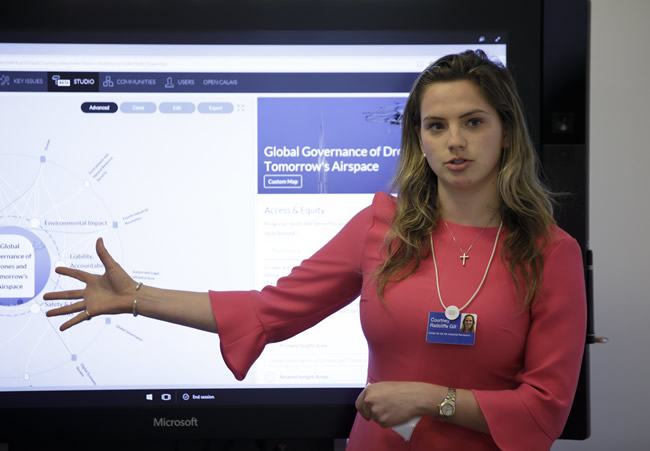
Photo: A Participant at the Inaugural Meeting of the Global Fourth Industrial Revolution Councils, 2019. Image provided by & Copyright © World Economic Forum / Stephen Porter. [File Photo]
Geneva, Switzerland, November 6, 2020 - The City of London Corporation, in collaboration with the Green Finance Institute and supported by the World Economic Forum, is hosting a virtual summit 9-11 November that will focus on green finance in the recovery from COVID-19.
The Green Horizon Summit will bring together leaders from government, business, and civil society to close the financing gap between net zero ambitions and reality. Each session will help drive forward the role of green finance in the recovery from COVID-19.
The Summit will cover five major themes:
- Reporting, Risk Management, and Return
- Financing the Energy Transition
- Infrastructure and Green Growth
- Financing Resilience and Adaptation
- Nature and Net Zero
All sessions will be live-streamed and captioned.
Featured speakers include:
Michael R. Bloomberg
Founder, Bloomberg LP & Bloomberg PhilanthropiesChristiana Figueres
Founder, Global OptimismLarry Fink
Founder, Chairman, Chief Executive Officer of BlackRock, IncKristalina Georgieva
Managing Director, International Monetary FundAntonio Guterres
The Secretary-General of the United NationsChristine Lagarde
President of the European Central Bank
The Forum will host day three (November 11) of the Summit. This ‘practitioners’ day’ will focus on putting the frameworks into place and funnel finance into a net-zero economy. It will feature a range of practitioners covering a new generation of asset managers, banking, big data, professional services to hear how we can make the transition a reality.
Key topics covered on this day include building common Environmental, Social, and Corporate Governance (ESG) metrics, shaping the future of work and skills, and accelerating and finance innovation that will facilitate the race to zero.
Source: World Economic Forum
|GlobalGiants.Com|







Edited & Posted by the Editor | 12:51 PM | View the original post
September 29, 2020
World Economic Forum: Leaders Rally for a 'Great Reset' to Achieve Global Goals
The global pandemic shows that the world urgently needs a new model for international cooperation.
Public-private collaboration is required more than ever to ensure this reboot is sustainable and inclusive.
The mobilization of 1,200 organizations through the COVID Action Platform shows what we can do to improve lives and livelihoods on a global scale.


Photos: Impressions from the Farewell Lunch at the Schatzalp session at the World Economic Forum Annual Meeting 2020 in Davos-Klosters, Switzerland. 24 January 2020. Images provided by & Copyright © World Economic Forum / Mattias Nutt.
Geneva, Switzerland, 24 September 2020 - In the closing session of the World Economic Forum’s fourth Sustainable Development Impact Summit, leaders called for governments, businesses, and civil society to create new kinds of cooperation to tackle COVID-19 and the climate crisis.
To achieve the Sustainable Development Goals (SDGs), diplomats urged leaders to seize the opportunity for a Great Reset; the idea championed by Klaus Schwab, Founder and Executive Chairman of the World Economic Forum.
The concept of globalization needs to be redefined, said Subrahmanyam Jaishankar, India’s Minister of External Affairs. “If you do an honest stocktaking of this last six or seven months, I don’t think it would be a good report card on most countries in most regions of the world,” he said, adding that the previous focus on trade, investment, and capital flows has to be broadened.
“Corona anywhere is corona everywhere,” he said. Along with issues such as terrorism and climate change, the pandemic forces us to “revise our sense of what is globalization,” he said.
Rania A. Al-Mashat, Minister of International Cooperation of Egypt, echoed these themes, saying of the COVID-19 pandemic: “Everybody has to be part of a collective solution. No country has a silver bullet. All of us had a chance to learn from each other. Despite shortcomings and pitfalls in handling certain things in the pandemic, there have also been a few successes. These successes have given us confidence,” she said.
One of the critical areas where more public-private dialogue and cooperation could be useful is between the United States, Europe, and China. Susana Malcorra, Dean, IE School of Global and Public Affairs, IE University, Spain, said that competition between the United States and China is not the only rivalry of concern. “There are tensions around the world,” she said. “So, what I would suggest is that we need to think about what I would call the best possible scenario, which is a competitive multilateralism,” she said. “We will not have in the foreseeable future a multilateral system based on one member state being in the driver’s seat and essentially having the rest lining up, like it or not.”
Pekka Haavisto, Foreign Minister of Finland, said that while European countries value transatlantic cooperation and share many values - Europe needs to “work with China on the big global issues, to find a global solution.”
The World Economic Forum designed the summit around the five pillars of the Great Reset: Better Business, Catalysing Cooperation, Harnessing Technology, Liveable Planet, and Shared Prosperity.
• Better Business
To help companies “walk the talk” on stakeholder capitalism and demonstrate how businesses generate long-term value.
The World Economic Forum, in collaboration with Bank of America, Deloitte, EY, KPMG, and PwC, released a set of environmental, social, and governance (ESG) metrics and disclosures.
• Catalyzing Cooperation
The COVID-19 Response Alliance for Social Entrepreneurs launched the Action Agenda with 60 organizations to support over 50,000 social entrepreneurs worldwide.
The World Economic Forum partnered with the International Renewable Energy Agency to help accelerate the industry transition to clean energy.
• Harnessing Technology
UpLink, launched at last year’s summit, now has 4,000 innovators and entrepreneurs on its platform, who have created over 500 solutions to help achieve the SDGs.
Through the UpLink Trillion Trees challenge and 1t.org, for example, 20 innovative and scalable solutions will be fast-tracked to conserve, restore, and grow 1 trillion trees by 2030.
• Liveable Planet
In one year, the Mission Possible Platform grew to over 200 companies covering seven of the most energy-intense and heavy transport sectors. These leaders reaffirmed their commitments at #SDI20 and called for all to reach net-zero by 2050 or sooner.
With the support of Forum’s Tropical Forest Alliance, the Consumer Goods Forum and 17 global corporations officially launched the Forest Positive Coalition of Action to tackle deforestation resulting from palm oil, soy, and paper, pulp, and fiber-based packaging.
• Shared Prosperity
Pooling vaccine procurement will accelerate the distribution of a COVID vaccine around the world. COVAX, which is co-led by GAVI and CEPI, is designed to do this. One hundred fifty-six economies, representing nearly two-thirds of the global population, are now committed to this. The Forum’s Manufacturing Alliance is an emerging initiative to help scale this production.
The World Economic Forum launched the Champions for Technology and Social Justice Community to help companies collaborate more closely with civil society on technology and social justice issues.
The World Economic Forum, committed to improving the world’s state, is an International Organization for Public-Private Cooperation. The Forum engages the foremost political, business, and other society leaders to shape global, regional, and industry agendas.
The World Economic Forum convened the fourth Sustainable Development Impact Summit under the theme “Realizing a Great Reset for Sustainable Development.” This virtual summit brought together more than 4,500 leaders from government, business, and civil society from more than 141 countries.
Source: World Economic Forum
|GlobalGiants.Com|
The Great Reset







Edited & Posted by the Editor | 12:36 PM | View the original post
August 26, 2020
World Economic Forum Appoints New Members to Board of Trustees.
• The Board of Trustees is the guardian of the World Economic Forum’s mission and values.
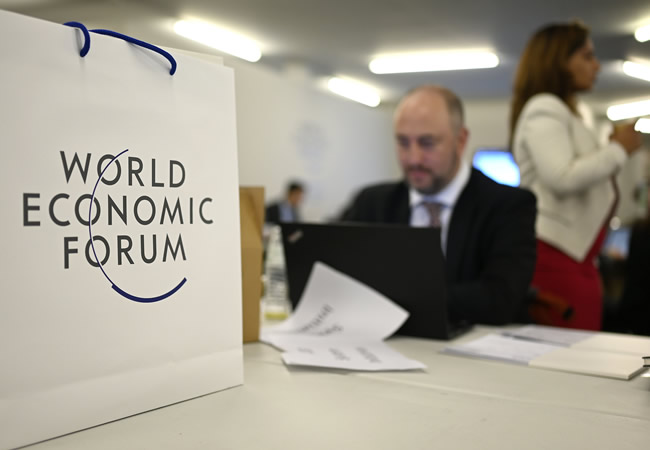
Photo: Impressions from the World Economic Forum Annual Meeting 2020 in Davos-Klosters, Switzerland, 20 January 2020. Image provided by & copyright © World Economic Forum / Valeriano Di Domenico.
Geneva, Switzerland, 26 August 2020 - The World Economic Forum appointed two new members to its Board of Trustees today. Rwanda’s Minister of Information Communication Technology and Innovation Paula Ingabire and Chief Executive Officer of AXA Thomas Buberl join the group serving as guardians of the Forum’s mission and values. The Board oversees the Forum’s work in promoting faithful global citizenship.
The Board of Trustees comprises outstanding leaders from business, politics, academia, and civil society. Its membership is divided equally between representatives of the business community and leaders from international organizations and civil society.
Paula Ingabire has served as the Minister of Information Communication Technology and Innovation of Rwanda since October 2018. Before her appointment, she was Head of ICT at the Rwanda Development Board and the Head of the Kigali Innovation City initiative. She led the implementation of National ICT programs and coordinated the creation of SMART Africa. She is part of Girls in ICT Rwanda and has worked to propel Rwanda forward in its rapid adoption of Fourth Industrial Revolution tools. In March 2020, she joined the Forum’s Young Global Leaders community.
Thomas Buberl has served as Chief Executive Officer of AXA since September 2016. He has been a member of the AXA executive committee since 2012 and held the role of Chief Executive Officer of AXA Konzern AG (Germany). Prior roles include the Chief Executive Officer for Switzerland for Zurich Financial Services and Member of the Management Board of Winterthur in Switzerland, first as Chief Operating Officer and then as Chief Marketing and Distribution Officer. In 2008, he was nominated as a Young Global Leader by the World Economic Forum.
As of 26 August 2020, the Members of the Board of Trustees of the World Economic Forum are:
- Klaus SCHWAB Chairman of the Board of Trustees, World Economic Forum
- Peter BRABECK-LETMATHE, Vice-Chairman, Board of Trustees, World Economic Forum, Chairman Emeritus, Nestlé SA, Switzerland
- H.M. Queen Rania AL ABDULLAH of the Hashemite Kingdom of Jordan
- Mukesh AMBANI, Chairman and Managing Director, Reliance Industries, India
- Marc BENIOFF, Chair and Chief Executive Officer, Salesforce, USA
- Thomas BUBERL, Chief Executive Officer, AXA, France
- Mark CARNEY, Finance Adviser on the 26th Conference of the Parties to the Prime Minister of the United Kingdom
- Laurence FINK, Chairman and Chief Executive Officer, BlackRock, USA
- Chrystia FREELAND, Deputy Prime Minister and Minister for Intergovernmental Affairs of Canada
- Orit GADIESH, Chairman, Bain & Company, USA
- Kristalina GEORGIEVA, Managing Director, International Monetary Fund, Washington DC
- Fabiola GIANOTTI, Director-General, European Organization for Nuclear Research (CERN), Geneva
- Al Gore, Vice-President of the United States (1993-2001); Chairman and Co-Founder, Generation Investment Management LLP, USA
- Herman GREF, Chairman of the Board and Chief Executive Officer, Sberbank, Russian Federation
- Angel GURRÃA, Secretary-General, Organisation for Economic Co-operation and Development (OECD)
- André S. HOFFMANN,* Non-Executive Vice-Chairman, Roche Holding Ltd., Switzerland
- Paula INGABIRE, Minister of Information Communication Technology and Innovation of Rwanda
- Christine LAGARDE, President, European Central Bank (ECB)
- Jack MA, Alibaba Board of Directors, Alibaba Group, People’s Republic of China
- Yo-Yo MA, Cellist
- Peter MAURER, President, International Committee of the Red Cross (ICRC), Switzerland
- Luis MORENO, President, Inter-American Development Bank, Washington DC
- Patrice Motsepe, Founder and Executive Chairman, African Rainbow Minerals, South Africa
- L. Rafael Reif, President, Massachusetts Institute of Technology (MIT), USA
- David M. RUBENSTEIN, Co-Founder and Co-Executive Chairman, Carlyle Group, USA
- Mark SCHNEIDER, Chief Executive Officer, Nestlé, Switzerland
- Tharman SHANMUGARATNAM, Senior Minister of Singapore
- Jim Hagemann SNABE, Chairman, Supervisory Board, Siemens AG, Germany; Chairman, A.P. Møller-Maersk, Denmark
- Feike SYBESMA, Honorary Chairman, Royal DSM, Netherlands
- Heizo TAKENAKA, Minister of State for Economic and Fiscal Policy of Japan (2002-2006)
- Min ZHU, President, National Institute of Financial Research, People’s Republic of China
Source: World Economic Forum
|GlobalGiants.Com|







Edited & Posted by the Editor | 4:21 PM | View the original post






